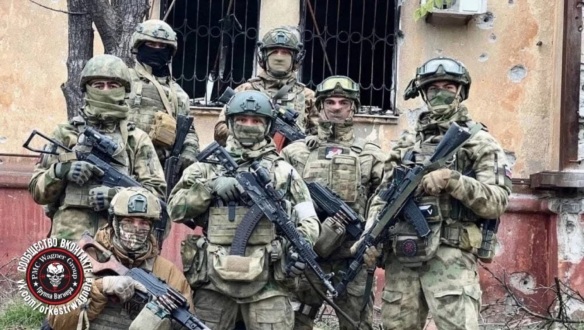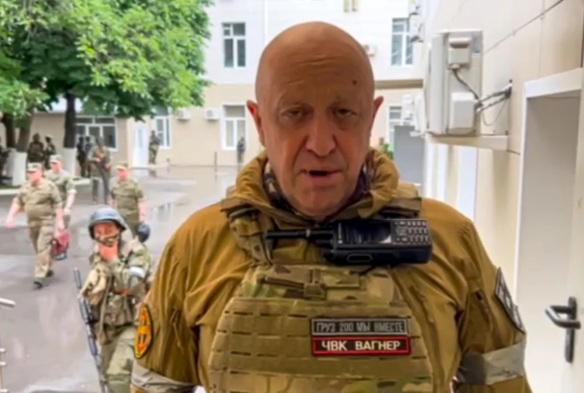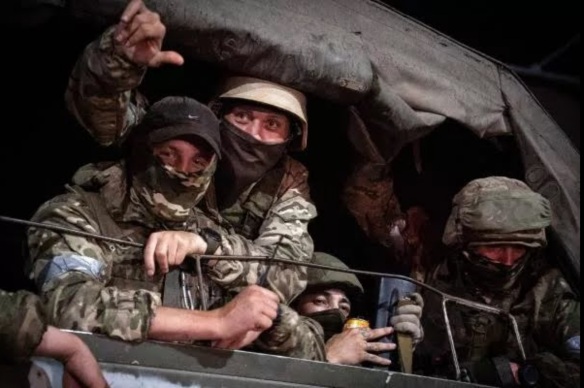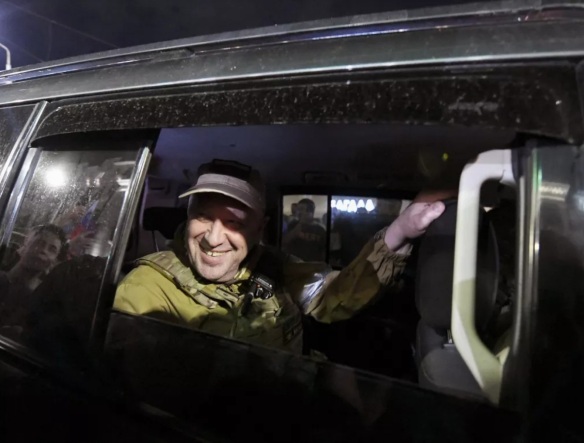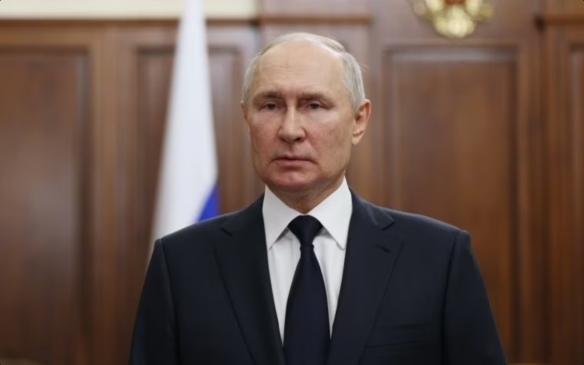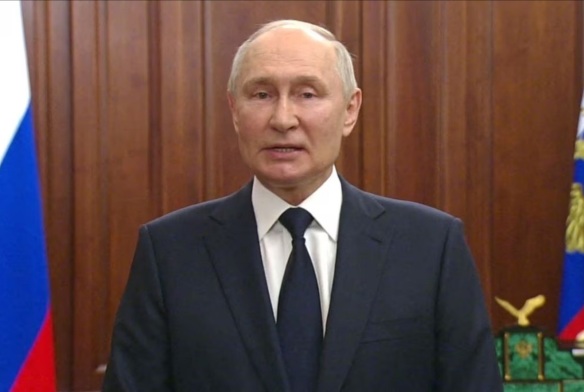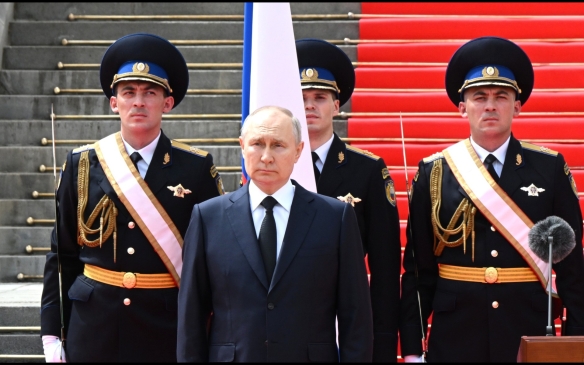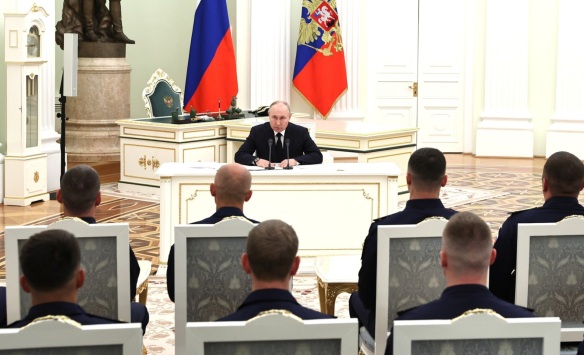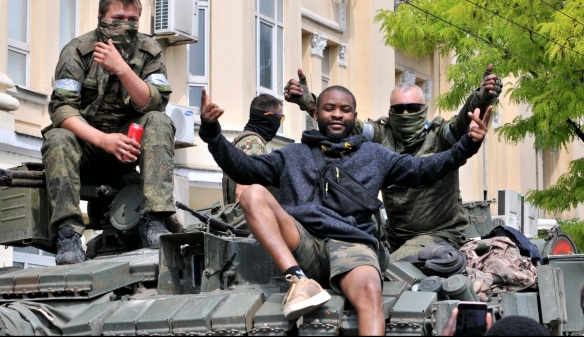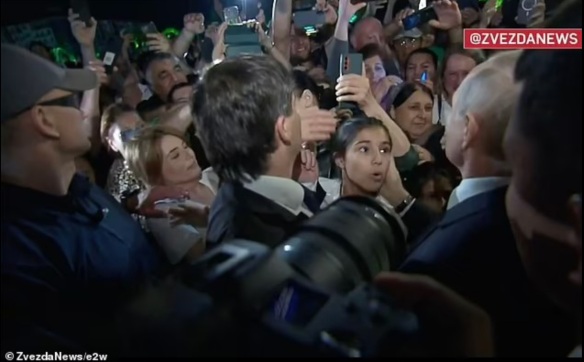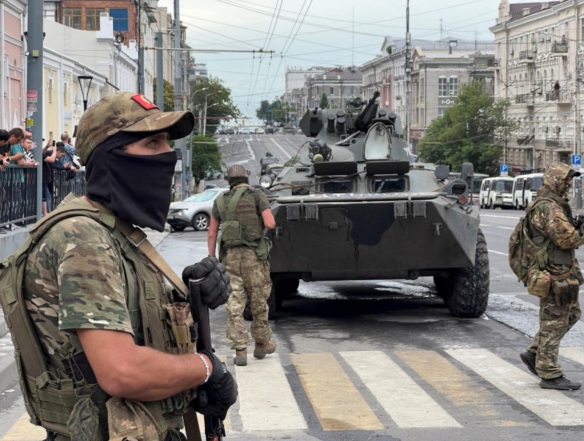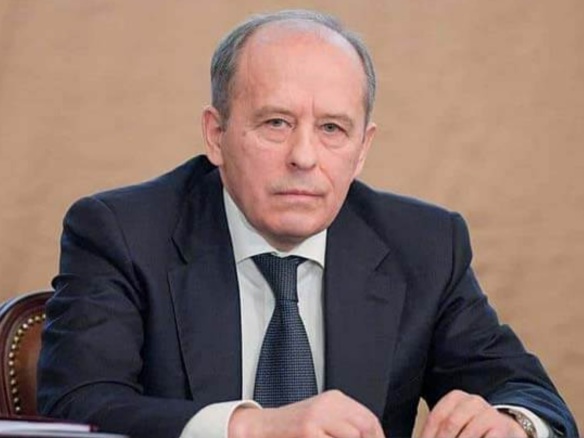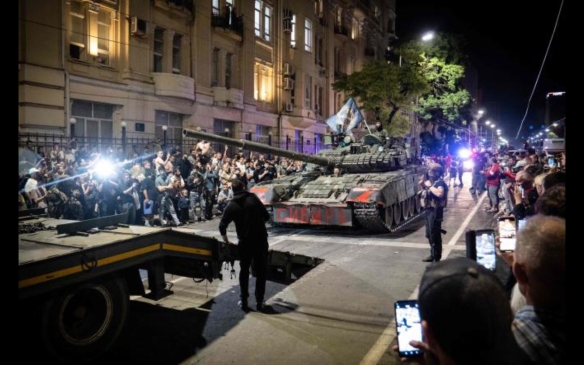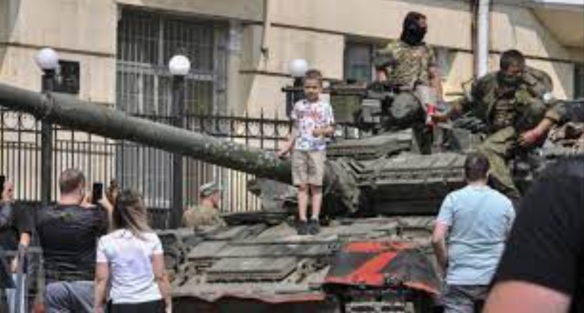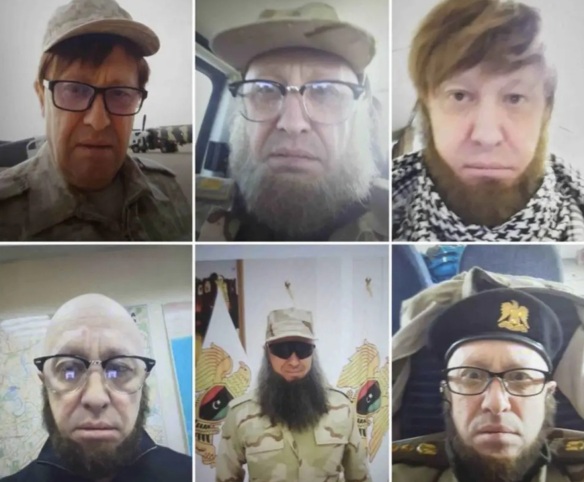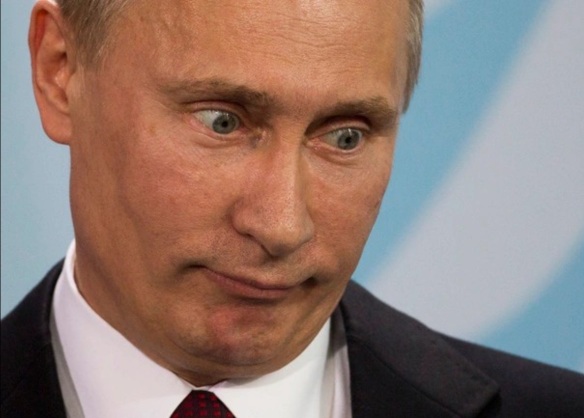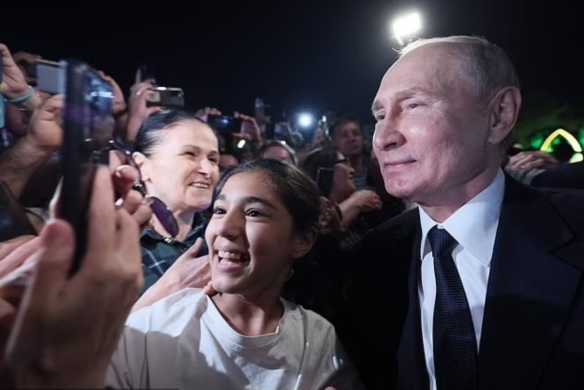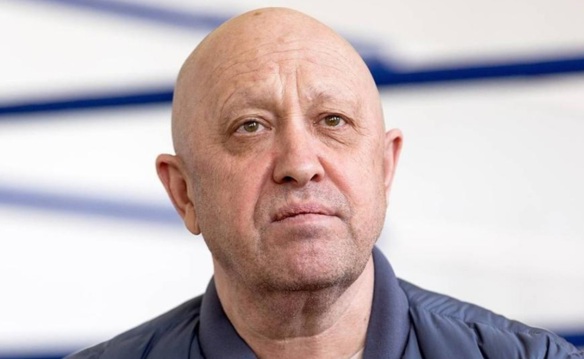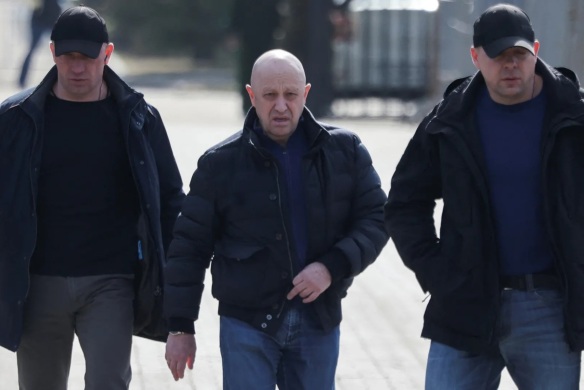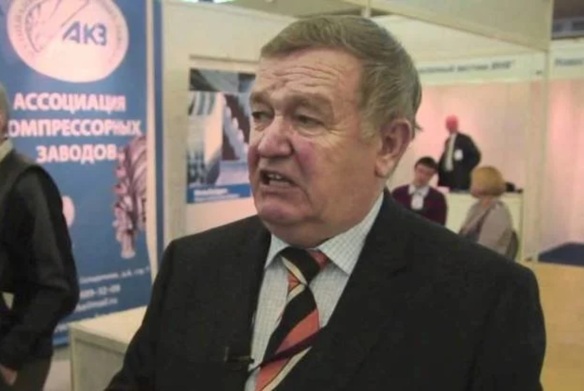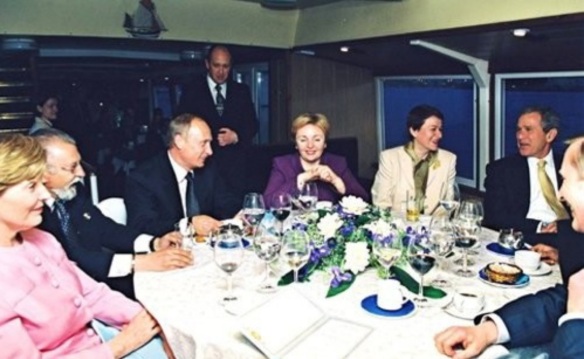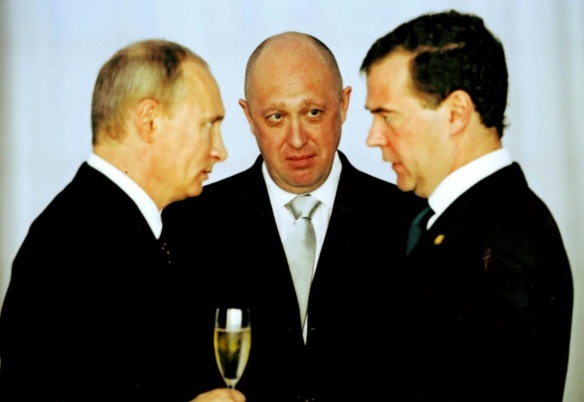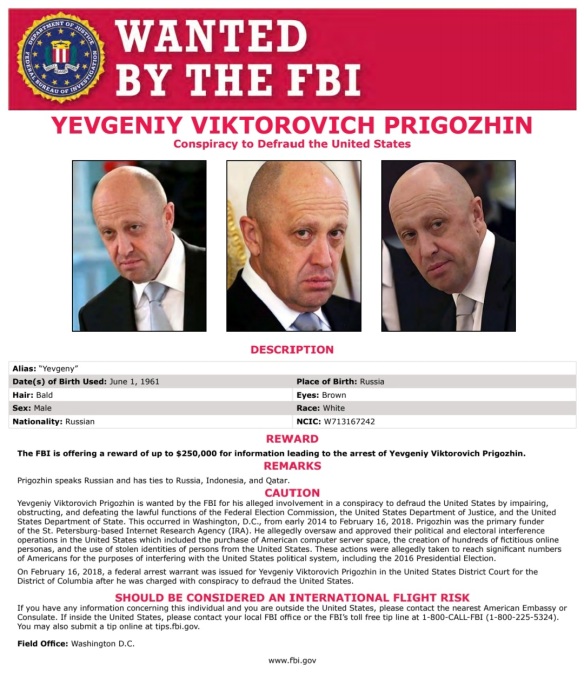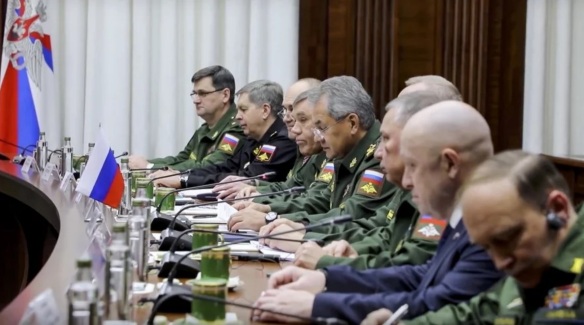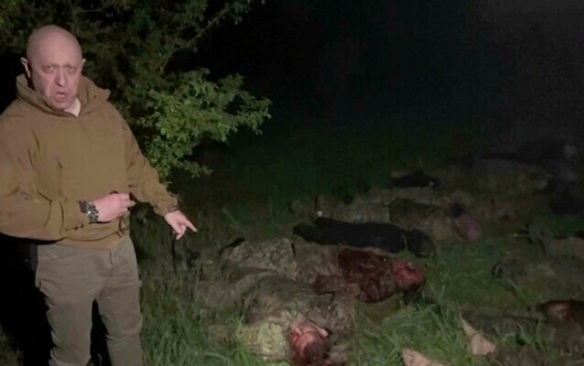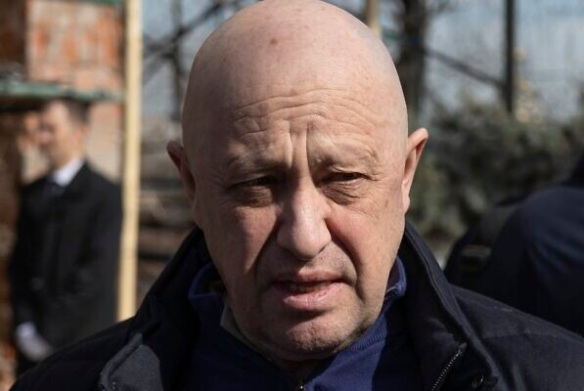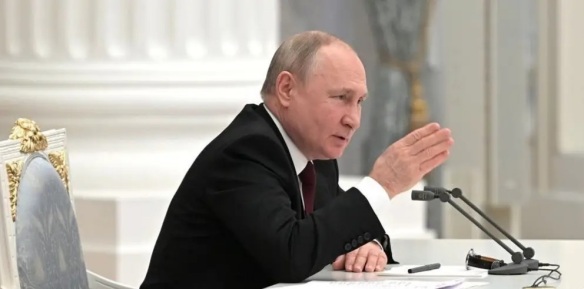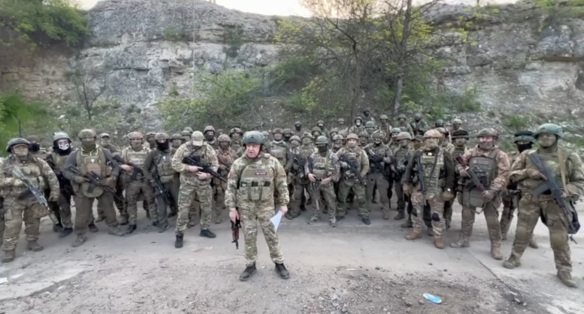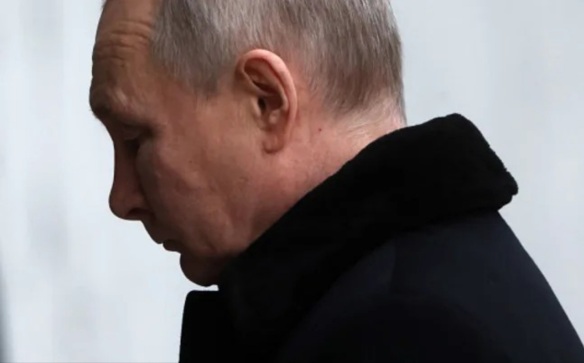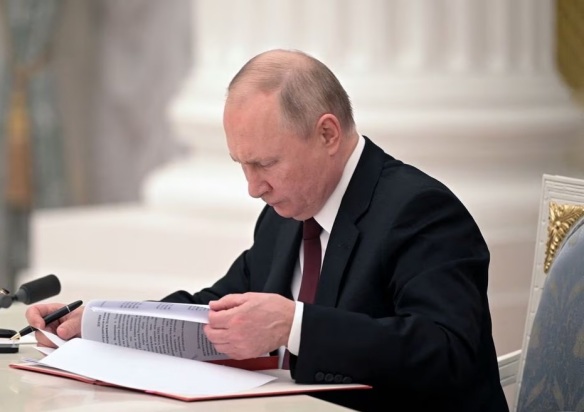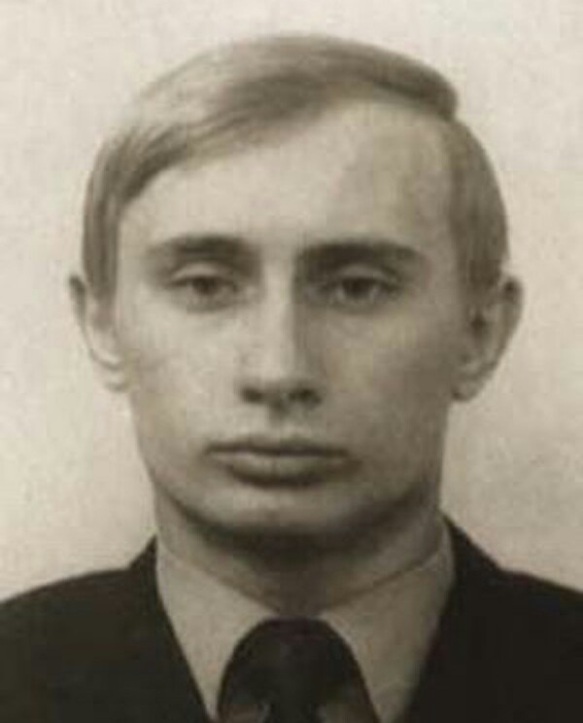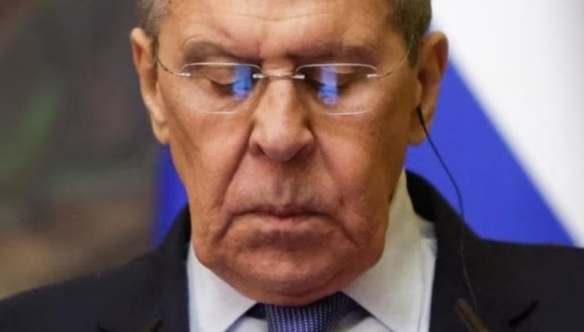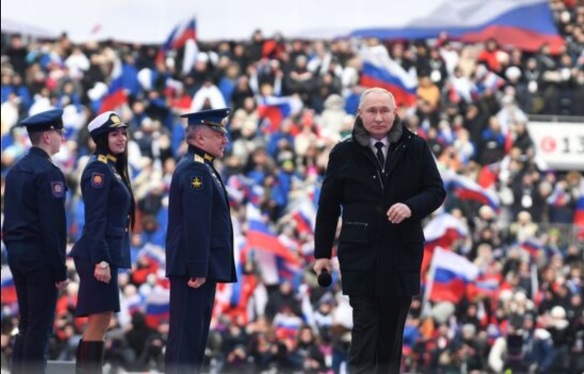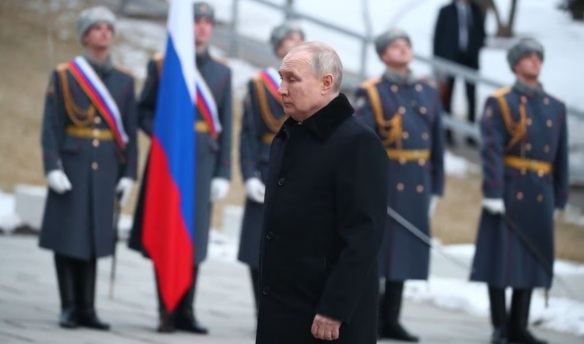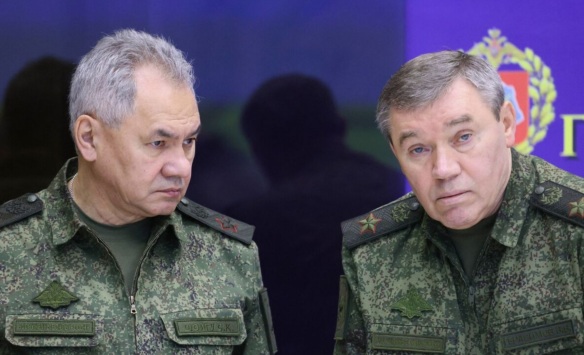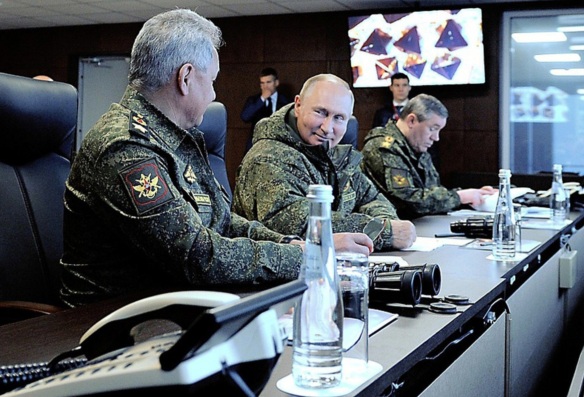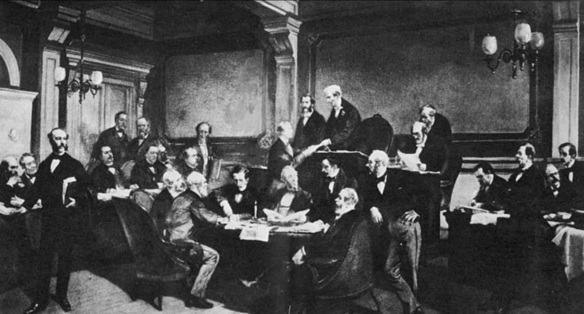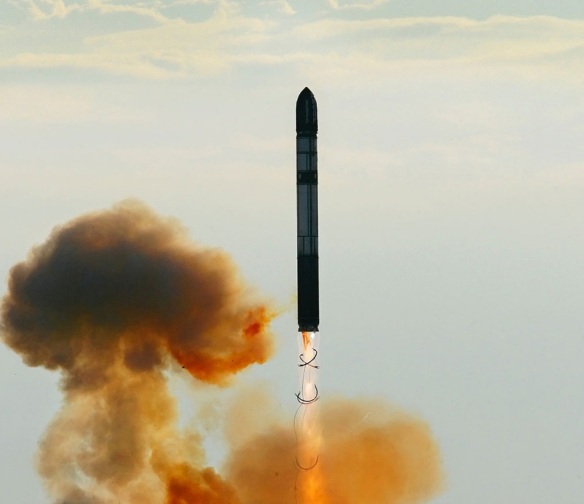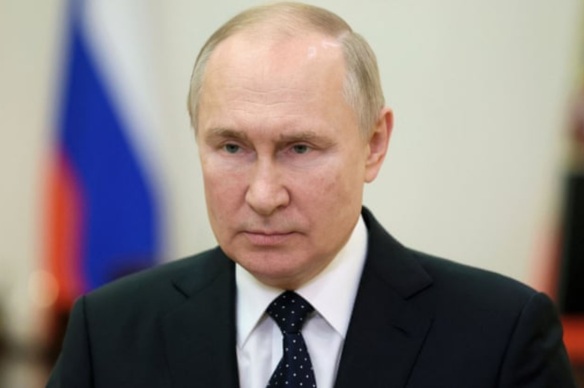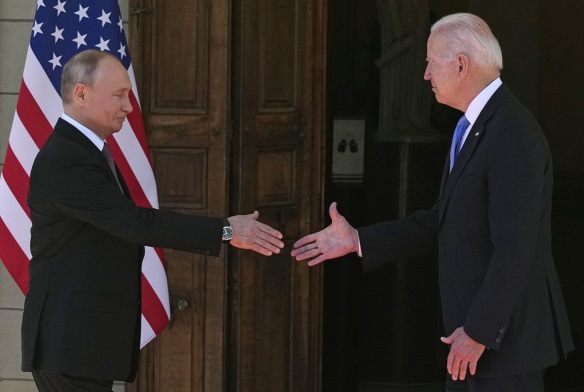“Official” company photo of veteran Wagner Group troops in Ukraine (above). Was their rebellion about their well-being, the war’s management, or something deeper? The common wisdom concerning the Wagner Group Rebellion is that it represented the biggest threat to Putin in his more than two decades in power, exposing his weakness and eroding the Kremlin’s authority. It was apparently easy to find a simple explanation when considering the facts in their true context would surely lead to a more complex one. Few experts and observers stirred controversy by contesting the conventional wisdom on the matter, For some, it may have been the case that they were uninterested in any other answer. On the matter of the Wagner Group Rebellion, as has been the case with nearly all things Putin, there only neeed to be the possibility for their wishes to be true for them to rush to judgment. From the start, greatcharlie had sought to stay out of the echo chamber of reports forecasting Putin’s imminent downfall, the downward spiral of the regime, and the end of Prigozhin, and the Wagner Group. It is greatcharlie’s contention that an alternate, somewhat more complex explanation of events is at hand.
This post should be considered a continuation of the preceding one.
On June 23, 2023, the government of the Russian Federation reportedly faced a crisis when what has been described as an armed insurrection was ignited by the private military corporation, ChVK Vagnera, popularly known as Gruppa Vagnera (the Wagner Group). At the center of events was the owner of the Wagner Group, Yevgeny Prigozhin. Although an intriguing figure in his own right, Prigozhin holds a level of standing with Russian Federation President Vladimir Putin which speaks volumes. Prigozhin is widely known in the Russian Federation by the cognomen “Putin’s chef” because of his catering businesses that organized dinners Putin hosted for foreign dignitaries. Prigozhin’s Wagner Group is well-known for its global paramilitary operations, particularly those in African hotspots, under the plausibly deniable auspices of the Russian Federation government. The Wagner Group was first called into action on a large scale in March 2014 during Russia’s annexation of Crimea. Nearly 1,000 members of the Wagner Group were also sent in to support ethnic-Russian separatists in the Donetsk and Luhansk Oblasts (provinces). However, Prigozhin’s close relationship with Putin and the Russian Federation government was ostensibly put in jeopardy, and, according to Western some newsmedia outlets, has been destroyed, given what greatcharlie will refer to here as the Wagner Group Rebellion. Some might suggest that problems really began when Prigozhin was asked to move greater numbers of Wagner Group troops into Ukraine once the Russian Federation’s Spetsial’noy Voyennoy Operatsii (Special Military Operation) was launched, he complied, but right away the situation went awry.
Strategically, tactically and operationally, the special military operation was a disaster. Russian Federation commanders rarely displayed military acumen on the battlefield. Russian Federation troops and contractors as the Wagner Group regularly lacked sufficient supplies of critical gear and ammunition. The most troubling aspect was the wasteful expenditure of Russian Federation troops and contractors, but especially the lives of Wagner Group troops without accomplishing anything substantial. With graduated intensity, Prigozhin made his disappointments known publicly and exposed much of what was going wrong for the Russian Federation in Ukraine. However, there was little change or it was at best glacial. The Russian Federation Armed Forces desperately needs the help of the Wagner Group in Ukraine, but Prigozhin has had a belly full of the delinquencies, deficiencies, and ineptitude of the Russian Federation military leadership which his organization has been directed to work under. By 2023, Prigozhin unquestionably behaved as if he were frenzied, and perhaps justifiably and reasonably so, with the great injustice put upon Wagner Group troops in Ukraine as well as the troops of the Russian Federation Armed Forces.
However on June 23, 2023, Prigohzin shifted from simply accusing Ministr Oborony Rossijskoj Federacii (Minister of Defense of the Russian Federation) Russian Army General Sergei Shoigu and Chief of General’nyy shtab Vooruzhonnykh sil Rossiyskoy Federatsii (General Staff of the Armed Forces of the Russian Federation), Russian Army General Valery Gerasimov of poorly conducting the then 16th month long special military operation when events took a graver turn. Prigozhin accused forces under the direction of Shoigu and Gerasimov of attacking Wagner Group camps in Ukraine with rockets, helicopter gunships and artillery and as he stated killing “a huge number of our comrades.” The Russian Federation Defense Ministry denied attacking the camps. In an act of daylight madness, Prigozhin then drove elements of the Wagner Group into the Russian Federation from Ukraine with the purpose of removing Shoigu and Gerasimov from their posts by force. His Wagner Group troops advanced to just 120 miles (200 kilometers) from Moscow. However a deal brokered by Belarus President Alexander Lukashenko was struck for the Wagner Group to halt. Prigozhin withdrew his forces to avoid “shedding Russian blood.”
The common wisdom concerning the Wagner Group Rebellion is that it represented the biggest threat to Putin in his more than two decades in power, exposing his weakness and eroding the Kremlin’s authority. It was apparently easy to find a simple explanation when considering the facts in their true context would surely lead to a more complex one. Few experts and observers stirred controversy by contesting the conventional wisdom on the matter, For some, it may have been the case that they were uninterested in any other answer. On the matter of the Wagner Group Rebellion, as has been the case with nearly all things Putin, there only needed to be the possibility for their wishes about it to be true for them to rush to judgment. In reality the picture drawn indicating the Wagner Group’s action was designed to bring down Putin’s regime is circumstantial and thereby enough to be convincing for many. Without pretension, greatcharlie confesses that it is burdened by an inquisitive mind. From the start, it had sought to stay out of the echo chamber of reports forecasting Putin’s imminent downfall, the downward spiral of the regime, and the end of Prigozhin, and the Wagner Group. It is greatcharlie’s contention that an alternate, somewhat more complex explanation of events is at hand. In this two part discussion, the suppositions presented are not founded on wild speculation on what may have transpired but rather conclusions reached on the basis of evidence and reasoning. If greatcharlie might be allowed the liberty, it freely admits that it would hardly know with a high degree of certainty what the thinking among Putin and his advisers was before the Wagner Group Rebellion. If modesty permits, greatcharlie believes it possesses some instinct for deciphering the thinking and actions of the Kremlin on foreign and national security policy matters. At the same time it fully recognizes that one’s instinct for such given all of the nuances can occasionally play one false.
Once it reached certain suppositions, greatcharlie freely admits delayed publishing this essay for although it was confident of its findings, events were moving so fast concerning the Wagner Group Rebellion that it believed aspects of this case would likely arise that it could hardly have anticipated. (Perhaps it is a singular comfort that can best be enjoyed by those editing small, independent blogs.) The decision was then made to publish even though events were still being played out with the aim of sharing its learning process and insights with readers, especially students with the hope to evoke a desire within them to consider with reason possibilities and ignite the development of their insights on what is known and ruminate upon potentialities from what is unknown. If greatcharlie might hope have any appeal to the community of foreign and national security policy analysts, in recent times it would be satisfied to merely be a stimulus to the policy debate of the Ukraine War.Omnia non properanti clara certaque erunt; festinatio improvida est, et cæca. (All things will be clear and distinct to the man who does not hurry; haste is blind and improvident.)
In a photo released by Prigozhin’s Press Service, the Wagner Group owner is seen recording one of several video addresses in Rostov-on-Don on June 24, 2023. Relative to Euromaidan in Ukraine or the Rose Revolution in Georgia, the Wagner Group Rebellion was very short in duration, something less than brief. To allow the crisis to continue beyond its day and a half to two day time span, likely would have been determined too risky. There would be the desire to prevent the slightest idea that Putin’s government could not maintain order domestically to take root in the minds of the Russian people. The mainstream Western newsmedia, as mentioned, still insists at the time of this writing that Putin is on the ropes. As noted, the perspective being offered in the mainstream Western newsmedia of the Wagner Group Rebellion being an overly aggressive and chaotic insurrection, a near uncontrollable crisis, was developed from a biased lens.
The Wagner Group Rebellion
As things moved, on the morning of June 23, 2023, Prigozhin alleged Russian Federation forces had launched a fire mission on Wagner Group troops in Ukraine causing considerable casualties. Prigozhin announced he had launched an armed effort with his Wagner Group to remove Shoigu and Gerasimov from the leadership of the Russian Federation Armed Forces. Wagner Group troops crossed from Ukraine into Russia and entered Rostov, meeting no resistance by border guards. Just after 12:00AM on June 23, 2023, it was reported in the newsmedia that the FSB issued a warrant for Prigozhin’s arrest.
About 8 hours after that, morning newsmedia reports showed Prigozhin and his Wagner Group in Rostov-on-Don 660 miles (over 1,000 kilometers) south of Moscow. They captured the headquarters of Southern Command of Russian Federation forces fighting in Ukraine. Prigozhin posts a public announcement by video on Telegram from the captured base to report events. Prigozhin stated: “We are inside the [Russian Army] headquarters, it is 7:30AM. Military sites in Rostov, including an aerodrome, are under control. Prigozhin then issued what amounted to warning and intriguingly foreshadowing certain events by saying: “Everyone who will try to put up resistance . . . we will consider it a threat and destroy it immediately, including any checkpoints that will be in our way and any aircraft that we see over our heads. I am asking everyone to remain calm and not succumb to provocations, stay in their homes. It is advisable not to go outside along the route of our movement.” Meanwhile, rather than behaving as an occupying, brutish force, reportedly videos posted on social media revealed armed Wagner Group troops, although controlling traffic at key intersections much as flagmen at a construction site, were mostly milling about in the city, ordering fast food, and walking about with takeout coffee. About 2 hours after that, Putin made a national address concerning the Wagner Group Rebellion. About 6 hours after that, Prigozhin is seen in a video widely broadcasted and posted online, discussing a deal to halt the rebellion and withdraw. On the heels of that, reports from the newsmedia indicated that Belarus President, Lukashenko, brokered the deal between the Kremlin and Prigozhin to end the “mutiny”. Wagner Group troops who participated in the rebellion would not be prosecuted, while those who did not join–presumably only those operating in Ukraine and not referring at all to those operating in African countries, in Syria, or elsewhere–would be offered contracts by the Russian Federation Defense Ministry. Prigozhin would leave the Russian Federation and remain in Belarus. Prigozhin ordered his troops back to their field camps in Ukraine. About 3 hours after that, Prigozhin and his Wagner Group troops had completely withdrawn from Rostov-on-Don. Units closest to Moscow quickly reversed course and returned directly to their bases. Prigozhin was seen ostensibly traveling to Belarus in a black armored SUV. In Rostov-on-Don, crowds of the city’s citizens cheered their erstwhile occupiers on.
About 48 hours after that, Putin made a late evening address broadcasted and posted online by the Russian Federation state-run and independent newsmedia concerning the rebellion in which he provided “more detail” regarding his decisionmaking and the “bigger picture.” About 12 hours after that, at an afternoon event held with much fanfare at the Kremlin’s Cathedral Square with some 2,500 members of the military, the security forces, and the National Guard in attendance, Putin expresses his appreciation for the efforts of the Russian Federation Armed Forces and the security services for halting the Wagner Group Rebellion. Lukashenko’s role did not receive mention on that occasion. He expresses sorrow and praise for the Russian Federation aircrews that lost their lives confronting the “mutineers.” About 2 hours after that, Putin in a smaller setting indoors, again addressed Defense Ministry, National Guard, FSB, Interior Ministry and Federal Guard Service units who reportedly “ensured law and order during the mutiny.” Putin again thanked the Russian Federation Armed Forces and the security services for halting the Wagner Group Rebellion. About 48 hours later, in the evening in the streets of Derbent, Dagestan in the Russian Federation, after the totality of the weekend’s events had a chance to settle well in the minds of the Russian people, Putin is shown in a video widely broadcasted in the country’s state-run and independent newsmedia greeting a very excited, sizable cheering crowd. The sense of genuine joy on his face upon engaging with the cheering Russian Federation citizens was most apparent.
Wagner Group troops in a company truck travel from the chaos of the frontlines to the serenity of Rostov-on-Don on June 24, 2023. On the morning of June 24, 2023, newsmedia reports across the Russian Federation showed Prigozhin and his Wagner Group in Rostov-on-Don, 660 miles (over 1,000 kilometers) south of Moscow. They captured the headquarters of Southern Command of Russian Federation Armed Forces, which was directing a considerable element of Russian Federation forces fighting in Ukraine. Meanwhile, rather than behaving as an occupying, brutish force, reportedly videos posted on social media revealed armed Wagner Group troops, although controlling traffic at key intersections much as flagmen at a construction site, were mostly milling about in the city, ordering fast food, and walking about with takeout coffee.
Relative to Euromaidan in Ukraine or the Rose Revolution in Georgia, the Wagner Group Rebellion was very short in duration, something less than brief. To allow the crisis to continue beyond its day and a half to two day time span, likely would have been determined too risky. There would be the desire to prevent the slightest idea that Putin’s government could not maintain order domestically to take root in the minds of the Russian people. The mainstream Western newsmedia, as mentioned, still insists at the time of this writing that Putin is on the ropes. As noted, the perspective being offered in the mainstream Western newsmedia of the Wagner Group Rebellion being an overly aggressive and chaotic insurrection, a near uncontrollable crisis, was developed from a biased lens.
Surely there were relatively significant attendant events in between the key events that occurred within the 24-hour news cycle. For example, the FSB seized the Wagner Group Headquarters. The Russian Federation military without fanfare established a protective posture in the southern portion of Moscow. The commander of the Southern Group of the special military operation, Russian Air Force General Sergei Surovikin, who was once the overall commander of the Russian Federation’s intervention in Ukraine, addressed the rebellious Wagner Group troops in a video message. The first deputy chief of Glavnoye Razvedyvatel’noye Upravleniye Generalnovo Shtaba (Main Intelligence Directorate of the General Staff-Military Intelligence) or GRU, Lieutenant General Vladimir Alekseyev appealed to rebellious Wagner Group troops in a video message. Shoigu and Gerasimov vanished from public view during the entire period. Perhaps the most chilling moment during the rebellion was when Wagner Group troops actually advanced just 200 kilometers (120 miles) from Moscow, according to Prigozhin. A column Wagner Group troops that reportedly included mounted tanks, armored vehicles, at least one self-propelled rocket launcher and numerous personnel trucks. had reached the Lipetsk province, about 360 kilometers (225 miles) south of Moscow. The downing of six Russian Army helicopters occurred while that column was en route to Moscow and the shoot-down of a Russian Air Force surveillance plane at some point. Surely, under the circumstances, the Russian people were hungry for information on events. The beginning of the day when Prigozhin was seen and when Putin made the first of his appearances during the episode, end of the day, when Putin made second appearance are times when the majority of the Russian people receive their news. Those moments turned out to be main events that did much to signal the direction the story was taking. Yet, the many pieces in-between as the few highlighted here also fit well within what could be characterized as the complex puzzle that was the Wagner Group Rebellion.
Once Prigozhin and his Wagner Group troops agreed on June 24, 2023 to withdraw from Rostov-on-Don, they departed immediately. Crowds of the city’s citizens cheered their erstwhile occupiers on. Units closest to Moscow quickly reversed course and speedily returned directly to their bases. Prigozhin was seen ostensibly traveling to Belarus in a black armored SUV. Surely the FSB has an office in Rostov-on-Don and FSB paramilitary units could have been rushed there. Indeed, Directorate “A” of the FSB Special Purpose Center (Alpha Group) and Directorate V of the FSB Special Purpose Center (Vympel) could have been sent in by Bortnikov. Perchance, it would have been easy enough for FSB officers, working alongside Αlpha Group or Vympel, to approach Prigozhin in Rostov-on-Don in a very professional way and serve him with a warrant for his arrest or at least have him come in for questioning. Instead, Prigozhin was given time to “hash out” matters with Belarusian President AlexanderLukashenko, and the State Secretary and Russian Federation Deputy Minister of Defense, General of the Reserve Army Nikolai Pavlov, who was present at Rostov-on-Don and seen in photos and video recordings negotiating with him.
The Narrative Putin Wanted the Russian People To Garner Regarding the Wagner Group Rebellion
Certainly, it never would have been considered sufficient in the eyes of the senior Kremlin officials to allow the Russian people to simply receive a well-paced flow of events on the Wagner Rebellion to decipher in many ways. State-run and independent newsmedia broadcasts did the job of letting them know events were taking place concerning the Wagner Group, the Russian Federation Defense Ministry, the Russian Federation General Staff and the special military operation. What they needed to hear and grasp about those matters would be explained to them by the ultimate source in the country, the Russian Federation President. To that extent, Putin provided four well-crafted addresses, one during and three immediately on the heels of the Wagner Group Rebellion.
Given the nature of the lens through which Putin apparently views the world, considering past public addresses, interviews, decisions and actions, his concise and succinct addresses in addition to well-communicating the required facts to the Russian people, had to meet what were his specific priorities. To that extent they reflected his mindset, emotions, state-of-being, reasoning, and intentions. He did not exactly offer water-tight explanations, but there was probably scant concern among Putin and his advisers that the overwhelming majority in the targeted audience would dive too deeply into his explanations or energetically question any aspect of them. Indeed, it was likely expected in the Kremlin that for the audience in the Russian Federation, it would be enough just to have some answers on the rather unique development.
Putin’s First Address on the Wagner Group Rebellion, June 24, 2023
From what greatcharlie can gather, among the top five points of his first address on June 24, 2023, at 10:00AM, Putin emphasized that challenges to the government of any kind would not be tolerated. For the first time, he characterized the leaders of the Wagner Group Rebellion as the opponent. Putin reminded the Russian people of the necessity of the special military operation and how essential victory will be to the long term security and safety of the Russian Federation and how the actions of the “conspirators” could have put the country in jeopardy. Putin, wearing a solid black suit and black pindot tie, stated: “Today, Russia is waging a tough struggle for its future, repelling the aggression of neo-Nazis and their patrons. The entire military, economic and informational machine of the West is directed against us. We are fighting for the lives and security of our people, for our sovereignty and independence, for the right to be and remain Russia, a state with a thousand-year history.” He added: “This battle, when the fate of our nation is being decided, requires consolidation of all forces. It requires unity, consolidation and a sense of responsibility, and everything that weakens us, any strife that our external enemies can use and do so to subvert us from within, must be discarded.” Offering a flash of his personal outrage over the rebellion, he went on to say dramatically: “Therefore, any actions that split our nation are essentially a betrayal of our people, of our comrades-in-arms who are now fighting at the frontline. This is a knife in the back of our country and our people.” However, far from eliminating the threat based in Kyiv, the Russian Federation Armed Forces have barely held on to initial gains made since the initial weeks of the war before Ukraine was better armed. The odds of it advancing further into Ukraine now are slim to none. Prigozhin ostensibly was acting in response to what perceived were actions by Shoigu and Gerasimov that would eventually cripple the Russian Federation’s ability to defend itself. Perhaps Putin had not been listening closely to Prigozhin’s tantrums after all.
Ever the historian, he discussed Russian history, specifically the 1917 Revolution in the middle of World War I in the context of current events. Putin stated: Any actions that split our nation are essentially a betrayal of our people, of our comrades-in-arms who are now fighting at the frontline. This is a knife in the back of our country and our people. He then said: “A blow like this was dealt to Russia in 1917, when the country was fighting in World War I. But the victory was stolen from it: intrigues, squabbles and politicking behind the backs of the army and the nation turned into the greatest turmoil, the destruction of the army and the collapse of the state, and the loss of vast territories, ultimately leading to the tragedy of the civil war.” One might argue that the Russian military was a spent force by 1917 and poorly led. At the Battle of Tannenberg in World War I, the Imperial German Army and the Russian Army clashed between August 23, 1914 and August 30, 2014. Exploiting the ability to transport troops by rail and their opponent’s poor communications security, German Field Marshal Paul von Hindenburg rapidly fielded the German Eighth Army at Olzytyn in East Prussia and well-deployed troops in superior position to delay the oncoming Russian First Army and concentrate upon the Russian Second Army. The large Russian force found itself in a meat grinder and was completely destroyed. The Russian Army suffered between 122,000 to 170,000 casualties. The commander of the Russian Second Army, General Alexander Samsonov committed suicide. A follow-on battle known as the Masurian Lakes resulted in the destruction of the First Army as well. The country’s forces were resuscitated to some degree by the Spring of 1915. However, those huge initial losses essentially knocked Russia out of World War I. As for the 1917 Revolution, it garnered support under the guise of offering the people a better existence, an alternative to penury. Misled and misguided, many followed the revolutionaries.
Putin assured the people that the matter was well in hand, the country was secure and the Russian Federation’s security will always be maintained. Putin stated: “The Armed Forces and other government agencies have received the necessary orders. Additional counterterrorism measures are now in effect in Moscow, the Moscow Region and several other regions. Resolute action will also be taken to stabilize the situation in Rostov-on-Don. It remains difficult; in effect, the work of civil and military authorities has been blocked.” These were certainly strong and comforting words for the Russian people. However, Putin’s government to that point had not been successful in handling very apparent threats to the country’s security. Zbrojni syly Ukrayiny (the Ukrainian Armed Forces) had launched several successful drone attacks and helicopter attacks on Russian Federation targets, including on Moscow, and as aforementioned in Part 1, there had been more than one attack on Russian Federation territory by anti-Putin, pro-Ukrainian, ethnic-Russian militant groups near the border with Ukraine. On the matter of the Wagner Group Rebellion, Putin had to emerge unconditionally victorious.
Putin also sought to leave no doubt that justice would nevertheless be served against wrong-doers. Putin stated: “Any internal revolt is a deadly threat to our statehood and our nation. It is a blow to Russia, to our people. Our actions to defend the Fatherland from this threat will be harsh. All those who have consciously chosen the path of betrayal, planned an armed mutiny and taken the path of blackmail and terrorism, will inevitably be punished and will answer before the law and our people.” However, Putin rather than dealing with “rebels” harshly, he directed Wagner Group troops to sign contracts with the Russian Federation Defense Ministry. Recognizably, under that arrangement, the Wagner Group, as it once stood in Ukraine, was essentially disbanded. The organization’s troops elsewhere in the world were apparently unaffected by the ruling. Yet, the Wagner Group right before the very eyes of the Russian people were being provided ample means to avoid prosecution and all penalties.
Conspicuously, a bit farther down in the address than one might have expected, Putin reminds the Russian people that he is in total control of the situation and the country in general. Rather remarkably, it seemed he consciously wanted to avoid placing himself at the center of unexpected events. He let the Russian people know that in response to any challenges of any kind he would use his full powers and those powers had no limits. Putin stated: “As the President of Russia and Supreme Commander-in-Chief, and as a citizen of Russia, I will take every effort to defend the country and protect the constitutional order as well as the lives, security and freedom of our citizens.” Although these remarks may not appear inordinate from Putin given inflamed sentiments of the moment and the fact that under his authoritarian regime, he had established limitless for himself. However, it also could have been something better than a warning shot that went beyond the events of June 2023 to others, “all sorts of political adventurers and foreign forces” as he remarked about players in the 1917 Revolution, seeking to benefit politically, economically, or even militarily by tearing the Russian Federation apart. Political opponents, “dangerous elements”, and foreign visitors likely have more to fear now in the Russian Federation than ever before. It would seem the world has yet to see the regime’s tyranny touch bottom.
Prigozhin went unnamed directly by Putin in his first address. Yet, presumably, even though he was not mentioned, Putin’s words in this first iteration of his addresses nevertheless may have sounded harsh enough to Prigozhin. Certainly, Prigozhin is not a fragile man. However, perhaps these initial words were spoken by Putin, an individual who he clearly holds in very high esteem pinched just a little. “Enjoy the Silence” is a song by English electronic music band Depeche Mode. Recorded in 1989, it was released on their album, Violator (1990). It is pertinent here to the extent that on June 25, 2023, Putin moved from near complete silence on the spat between Prigozhin, Shoigu, and Gerasimov to a veritable roar in his address to his nation. For Prigozhin, no matter what was altogether transpiring, they must have had their impact. The lyrics of the first verse are: “Words like violence / Break the silence / Come crashing in / Into my little world / Painful to me / Pierce right through me / Can’t you understand?”
From what greatcharlie can gather, among the top five points of his first address on June 24, 2023, at 10:00AM, Putin, for the first time, characterized the leaders of the Wagner Group Rebellion as the opponent. Putin reminded the Russian people of the necessity of the special military operation and how essential victory will be to the long term security and safety of the Russian Federation and how the actions of the “conspirators” could have put the country in jeopardy. Forever the historian, he discussed Russian history, specifically the 1917 Revolution in the middle of World War I in the context of current events.Putin assured the people that the matter was well in hand, the country was secure and the Russian Federation’s security will always be maintained. Putin also sought to leave no doubt that justice would nevertheless be served against wrong-doers. Conspicuously, a bit farther down in the address than one might have expected, Putin reminds the Russian people that he is in total control of the situation and the country in general. Rather remarkably, it seemed he consciously wanted to avoid placing himself at the center of unexpected events. He let the Russian people know that in response to any challenges of any kind he would use his full powers and those powers had no limits.
Putin’s Second Address on the Wagner Group Rebellion, June 26, 2023
Among the top five points Putin wanted to communicate n his second address concerning the Wagner Group Rebellion, he wanted to assure the Russian people that his dominion over the Russian Federation had not been challenged and that he was firmly in control. He thanked the Russian people for their support. He emphasized that departments of his government responsible for dealing with the Wagner Group Rebellion were always on top of matters and handling them swiftly and diligently and all other parts continued to perform their functions without interruption. Putin, wearing a solid dark navy blue suit and solid dark navy blue tie, stated: “I will repeat–society and the executive and legislative branches of government at all levels displayed high consolidation. Public organizations, religious denominations, the leading political parties and actually all of Russian society held a firm line, taking an explicit position of supporting constitutional order. The main thing–responsibility for the destiny of the Fatherland–has united everyone, brought our people together.” He said further: “I will emphasize that all necessary decisions to neutralize the emerged threat and protect the constitutional system, the life and security of our citizens were made instantly, from the very beginning of the events.” These comments would be expected of Putin–or any leader in his situation–in the aftermath of the rebellion. However, if his government actually “had been on the case” as he suggests, the Wagner Group Rebellion hardly would have gotten off the ground. The conspirators, as he refers to the Wagner Group leadership, would presumably have been twinkled out and approached for questioning by the security services.
In the minds of the Russian people, Putin sought to cast the leaders of the Wagner Group Rebellion as the opponent, disloyal to the government, to them, and to him. He disturbingly characterized them as mutineers who dared to carry out their plot at a time when the country was already facing a threat from external forces, mainly “neo-Nazis in Kiev.” Putin stated: “Having betrayed their country and their people, the leaders of this mutiny also betrayed those whom they drew into their crime. They lied to them, pushed them to their death, putting them under attack, forcing them to shoot their people. He continued: “It was exactly this outcome, fratricide, that the enemies of Russia–the neo-Nazis in Kiev, their Western patrons and other national traitors–wanted to see. They wanted Russian soldiers to kill each other; they wanted the military and civilians to die; they wanted Russia to lose eventually, and our society to break up and perish in a bloody feud.” All of this was said despite Prigozhin’s earlier expressions indicating the rebellion was an impromptu emotional reaction–originally understood to be the result of an attack on the organization’s camp in Ukraine by Russian Federation troops under the direction of Shoigu and Gerasimov–Putin in his address alters that narrative by explaining that it was the threat of the cudgel and not good brains that brought the matter to close. That his ever-vigilant government, particularly the work of the Russian Federation Armed Forces and the security services–that allowed the Wagner Group to cross the border into the Russian Federation untouched–crushed the plot. One might consider that plots that are part of false flag operations tend to be the easiest plots to sort out. “Go figure!”
Adding to perceptions that the Wagner Group Rebellion was the opponent, yet at the same time paradoxically weakening the notion that there was anything too deep in the thinking of the “conspirators”, Putin emphasized the reckless nature of the conspirators’ undertaking. Putin stated: “An armed mutiny would have been suppressed in any event. Mutiny plotters, despite the loss of adequacy, were bound to realize that. They understood everything, including the fact that their actions were criminal in nature, aimed at polarizing people and weakening the country, which is currently countering an enormous external threat and unprecedented pressure from the outside. They did this at a time when our comrades are dying on the frontline with the words “Not a step back!” There was irony in this idea as the crux of Prigozhin’s ire for months was the reckless and incompetent manner in which his Wagner Group troops and Russian Federation troops had been used in the special military operation how ironic and bizarre it was for him to undertake such a monumentally reckless and hopeless action as to march on Moscow to remove Shoigu and Gerasimov from power. If the lives of Russian Federation Armed Forces’ aircrews had not been reportedly lost in the near final stage of the impromptu rebellion, the whole enterprise could be chuckled at for being comical.
Putin seemed to insist touchingly that all Russian lives matter, the indication and implication being that the Russian people are precious to him, and preserving Russian lives has always been a priority in his decisionmaking. He disturbingly characterized them as mutineers who dared to carry out their plot at a time when the country was already facing a threat from external forces, mainly “neo-Nazis in Kiev.” Still, he indicated that his desire to prevent greater bloodshed, and the fact that he held troops of the Wagner Group in high-esteem for what they had done in the past for the country, tempered his response to their drive on Moscow. Putin stated: “We knew before and know now that the majority of Wagner Group soldiers and commanders are also Russian patriots, loyal to their people and their state. Their courage on the battlefield when liberating Donbass and Novorossiya proves this. An attempt was made to use them without their knowledge against their comrades-in-arms with whom they were fighting shoulder to shoulder for their country and its future.” He went on to explain: “That is why, as soon as these events started to unfold, in keeping with my direct instructions, steps were taken to avoid spilling blood. It required time, among other things, as those who made a mistake had to be given a chance to change their minds, to realize that their actions would be strongly rejected by society, to understand what tragic and devastating consequences for Russia, for our country the reckless attempt they had been drawn into, was leading to.” Despite the fact that Putin, by displaying restraint during the “crisis” did save Russian lives, ironically and incredulously, as a result of his special military operation, astronomical and abominable losses had been suffered by Russian Federation troops and contract fighters in Ukraine over 16 months to that point in time. One might suppose the careless loss of those troops could be set down as occasional mistakes.
Putin wanted to inform the Russian people about the remedy he came upon for handling the Wagner Group troops and their leaders. Covering what was already known through the Russian Federation’s state-run and independent newsmedia that day, he explained that those Wagner Group troops who had participated in the rebellion were free to go to Belarus. He also confirmed that those who wished to continue in the fighting in Ukraine could sign contracts with the Russian Federation Defense Ministry. However, Putin then mentioned a step that was an odd twist beyond simply signing contracts with the Defense Ministry. He invited the former Wagner Group “mutineers” to sign contracts with law enforcement or the security services. Putin stated: “I express my gratitude to those Wagner Group soldiers and commanders who had taken the right decision, the only one possible–they chose not to engage in fratricidal bloodshed and stopped before reaching the point of no return.” He then said: “Today, you have the opportunity to continue your service to Russia by signing a contract with the Defence Ministry or other law enforcement or security agency or return home.” It was a rather gracious opening of doors of the government’s defense and security services to rebels who he initially created the impression in his address of being associated with a conspiratorial and reckless leadership. Unexpectedly, Putin added to all he said on matter the statement, “I will keep my promise.” Imaginably, that was presumed. Perhaps it should not have been.
With regard to allowing the Wagner Group troops to move to Belarus, to greatcharlie that seemed a curious decision. Belarus is hands down the Russian Federation’s closest ally. One might call the relationship Putin has established between the two countries as the most successful effort in his quest to bring the former republics of the Soviet Union into the Russian Federation’s fold. Putin recently placed several nuclear warheads in storage in Belarus. To that extent, many of the erstwhile Rebel Wagner Group troops possess exquisite special operations capabilities and could pose a threat in terms of potentially capturing those warheads. One might suppose the weapons are secured so well in their new homes that a build up of the Wagner Group troops was nothing to signify. Intriguingly, one might consider that Belarus borders Ukraine and a number of NATO countries. Sending the Wagner Group troops there could have been predicted to cause considerable alarm in the capitals of those bordering countries and in NATO Headquarters. (Interestingly, it is now understood that Wagner Group troops in Belarus, far from a spent force, are providing tactical training to Belarusian troops.) Prigozhin was not named directly by Putin in his second address.
Among the top five points Putin communicated, he assured the Russian people that his dominion over the Russian Federation had not been challenged and that he was firmly in control. He thanked the Russian people for their support. He emphasized departments of his government responsible for dealing with the Wagner Group Rebellion were always on top of matters, handling them swiftly and diligently, and all other parts continued to function without interruption. In the minds of the Russian people, Putin sought to cast the leaders of the Wagner Group Rebellion as the opponent, disloyal to the government, to them, and to him. He disturbingly characterized them as mutineers, who dared to carry out their plot at a time when the country was already facing a threat from external forces. Under the theme greatcharlie has dubbed “Russian Lives Matter”, Putin seemed to insist touchingly that all the Russian people are precious to him, and preserving Russian lives has always been a priority in his decisionmaking. He claimed his desire to prevent greater bloodshed, and the fact that he held troops of the Wagner Group in high-esteem for what they had done in the past for the country, tempered his response to their drive on Moscow. Putin then informed the Russian people about his somewhat remedy for handling the Wagner Group troops and their leaders.
Putin’s Third Address on the Wagner Group Rebellion, June 27, 2023
On June 27, 2023, at 1:25PM, at an event titled by the Kremlin as an “Address to Defence Ministry, National Guard, Federal Security Service, Interior Ministry and Federal Guard Service Units which Ensured Law and Order during the Mutiny”, Putin thanked the Russian Federation Armed Forces, National Guard, and the security services for halting the Wagner Group Rebellion. The Kremlin event was frightfully well choreographed especially since it was supposed to be impromptu and on the heels of a crisis that supposedly had all energy in the Kremlin focused upon handling it. A greater audience of the Russian people was enabled to receive the address via Russian Federation state-run and independent newsmedia. Seemingly speaking to the newsmedia’s audience, not in attendance physically, Putin, wearing a solid navy blue suit and black muted checkered tie, stated: Today, standing here on the historic Cathedral Square of the Moscow Kremlin are the service personnel of the Russian Federation Armed Forces, soldiers and officers of the National Guard, the Federal Security Service, the Interior Ministry and the Federal Guard Service. They are the ones who, together with their comrades-in-arms, at a time of challenge for the country, threw themselves in the way of trouble which would have inevitably led to chaos. More directly addressing the assembled audience of some 2,500 members of the Russian Federation Armed Forces, the security forces, and the National Guard, Putin stated: “You have defended the constitutional order, as well as the life, security and freedom of our citizens, steering our Motherland clear from upheavals and de facto stopping a civil war in its tracks. He continued: “In that complicated situation, you acted in a firm and coordinated manner, proving your commitment to the people of Russia and to your military oath through your actions and showing responsibility for the destiny and future of Russia.”
Revealing what had transpired and how exactly order was maintained with little armed struggle, Putin stated: “In that complicated situation, you acted in a firm and coordinated manner, proving your commitment to the people of Russia and to your military oath through your actions and showing responsibility for the destiny and future of Russia.” Pointing to exactly what was daunting about their activities that it compelled special praise, Putin explained: “Defense Ministry units, the National Guard, officers of the Interior Ministry and special services ensured reliable operation of all critical decision-making bodies, strategic facilities, including the defense ones, ensured the security of border regions, the rear lines of our Armed Forces, of all combat units which carried on with their heroic frontline operations during that time. We did not have to withdraw any combat troops from the special military operation zone.
Emphasizing his concern for Russian lives, Putin called attention to the fact that an unspecified number of airmen of Russian Federation Armed Forces had been killed in the action, attempting to halt the advance of Wagner Group Rebellion. Putin stated: “Our comrades-in-arms–pilots–lost their lives while confronting the mutineers. They held their ground and fulfilled their orders and their military duty with honor. I am asking you to observe a minute of silence in tribute to their memory.” silence.” One might say Putin was making an extra effort to get a message across here that was not so easy for the Russian people to accept from him given the events in Ukraine that Russian soldiers’ lives matter.
In his first and second addresses, Putin excoriated the Wagner Group’s leaders, going as far to say in the first address: “Having betrayed their country and their people, the leaders of this mutiny also betrayed those whom they drew into their crime. They lied to them, pushed them to their death, putting them under attack, forcing them to shoot their people.” That noisome tack was toned down quite a bit as he only gave the Wagner Group leaders in context of how well the Russian Federation Armed Forces, the security forces, and the National Guard mitigated their efforts. Putin stated: “Your resolve and courage, along with consolidation of Russian society, played an essential and decisive role in bringing the situation back to normal. Those who were drawn into the mutiny saw that the army and the people were not with them.”
Displaying further concern for the lives of the Russian people from another perspective, Putin emphasized his success in preventing harm to the Russian civilians specifically. Putin stated: “The swift and well-managed deployment of defense, security and law enforcement units helped prevent the situation in the country from going down a very dangerous road and ensure that there were no civilian casualties. He then remarked: “I extend my gratitude to you and all the personnel of the Armed Forces, law enforcement agencies and security services for your service, courage and valor, for your devotion to the people of Russia.” Prigozhin was not named directly by Putin in his third address.
On June 27, 2023, at 1:25PM, at an event titled by the Kremlin as an “Address to Defence Ministry, National Guard, Federal Security Service, Interior Ministry and Federal Guard Service Units which Ensured Law and Order during the Mutiny”, Putin thanked the Russian Federation Armed Forces, National Guard, and the security services for halting the Wagner Group Rebellion. The Kremlin event was frightfully well choreographed especially since it was supposed to be impromptu and on the heels of a crisis that supposedly had all energy in the Kremlin focused upon handling it. A greater audience of the Russian people was enabled to receive the address via Russian Federation state-run and independent newsmedia. Among his top five point, he revealed to the Russian people what had transpired and how exactly order was maintained with little armed struggle, Emphasizing his concern for Russian lives, Putin called attention to the fact that an unspecified number of airmen of Russian Federation Armed Forces had been killed in the action, attempting to halt the advance of Wagner Group Rebellion. His noisome tack of excoriating Wagner Group leaders was toned down quite a bit as he only gave the Wagner Group leaders in context of how well the Russian Federation Armed Forces, the security forces, and the National Guard mitigated their efforts.Displaying further concern for the lives of the Russian people from another perspective, Putin emphasized his success in preventing harm to the Russian civilians specifically.
Putin’s Fourth Address on the Wagner Group Rebellion, June 27, 2023
On June 27, 2023, at 3:00PM, Putin spoke to personnel of the Russian Federation Defense Ministry separately, thanking those present and their comrades serving everywhere for their loyal and dedicated service. He ostensibly wanted to more directly thank those whose efforts repulsed the recent Wagner Group Rebellion and those who have served in Ukraine. It also seemed that he did not communicate the message on the Wagner Group Rebellion to his full satisfaction. There was some nuance to his message about matters that he apparently felt compelled to transmit in a fourth round. The address would reach the Russian people via Russian Federation state-run and independent newsmedia. This final iteration of his Wagner Group Rebellion addresses presented almost immediately following his address in Cathedral Square.
Putin was a bit less formal in thanking those whose efforts repulsed the recent Wagner Group Rebellion and those who have served in Ukraine. Putin began his address by once again expressing his thanks and appreciation for the efforts of the armed forces and security services. Putin, still wearing a navy blue suit and black muted checkered tie, stated: “You and your comrades had a special part to play in this. Special words of gratitude go to you. I want us all to understand what happened and what could have happened if you hadn’t done what you did and hadn’t fulfilled your military duty and hadn’t shown loyalty to your oath and the Russian people. As is always the case during such developments – the same thing happens every time and everywhere – armed rebellions are usually followed by total chaos and civil war. This is what you have prevented. That was your role. As the Supreme Commander-in-Chief, I would like to express my gratitude to you. I want to make clear what it was all about and what I am talking about now.”
Under the theme greatcharlie has dubbed “Russian Lives Matter”, Putin again emphasized his success in preventing harm to the Russian people specifically. Putin stated: “As is always the case during such developments–the same thing happens every time and everywhere–armed rebellions are usually followed by total chaos and civil war. This is what you have prevented. That was your role. As the Supreme Commander-in-Chief, I would like to express my gratitude to you. I want to make clear what it was all about and what I am talking about now. He went on: “Regrettably, you had to work in difficult circumstances in order to avoid civilian casualties, because you had to work on busy motorways.” Speaking of them and their well-being so often, it would appear that a primary takeaway from the whole episode that Putin wanted the Russian people to garner was that they were always on his mind and that they were what mattered most to him. It could not be missed by any who heard any of his four addresses.
While continuing to speak in unfriendly terms about those who participated in the rebellion, Putin apparently decided it was time to completely mitigate talk about the Wagner Group and its leaders as mutineers and traitors. He shifts to focusing on external enemies as the opponent. Putin stated: “The fact that we have losses is even more regrettable. These are, of course, combat losses. There is no other way to put it. Our comrades died defending the Fatherland. It is not an overstatement or an exaggeration. I want to stress once again that chaos in the country would have been inevitable, and the enemy would have surely taken advantage of it. He continues: “The enemy is trying to do so anyway–I will get to that a little later–but nothing is coming out of it, and, I hope, nothing will come out of it, I am even sure of that. But it is absolutely clear that they would have taken advantage of it. No one knows what would have become of the country in the end, but all the achievements that have been made during the hostilities, many of them, anyway, would have been lost. And you prevented it.” In a way, the shift in whom Putin focused on as the opponent marked the close of the Wagner Group Rebellion as the issue of primacy. For members of the Wagner Group there may have been some sense of relief having suffered his bombardment of obloquy.
What started as a simple speech on the role of the Russian Federation Armed Forces in halting the Wagner Group Rebellion and some general military matters to military personnel oddly appeared to become an example of why one should elegantly limit how much one should talk if the goal is to control information. Putin laid out some facts about the Wagner Group that in the context of the event might have appeared disturbing to discerning ears. Perhaps he was in a very transparent way attempting to create a greater schism between the Russian Federation Armed Forces and the Wagner Group by disparaging the latter. Perhaps he wanted to convince members of the Russian Federation Armed Forces that although he liked the Wagner Group troops, they were his favorites. Perhaps he was having a little too much fun with it all. Perhaps Putin was concerned some in the Russian Federation might have imagined the Russian Federation Armed Forces and the Wagner Group colluded on the rebellion. That would be a dangerous idea that he would urgently need to knock down.
Putin oddly explained how the Russian Federation government was always the resource–the engine–that funded, supplied, and energized the Wagner Group. In his own words, Putin stated: “I would like to point out, and I want everyone to be aware of the fact that all of the funding the Wagner Group received came from the state. It got all its funding from us, from the Defence Ministry, from the state budget. Between May 2022 and May 2023 alone, the Wagner Group received 86,262 million rubles from the state to pay military salaries and bonuses, including 70,384 million rubles for payroll and 15,877 million rubles for paying out bonuses. Insurance premiums totalled 110,179 million.” Surely, it was an odd set of statements to make before a group of military officers and security service members. Gone were the days of plausible deniability for the Russian Federation government with regard to the Wagner Group’s activities worldwide. Yet, more importantly, Putin admits plainly that all of the activities of the Wagner Group were funded by the Russian Federation government. To that extent, via Prigozhin and his firm Concord–discussed in some detail in Part 1, the Wagner Group Rebellion was completely funded by the Russian Federation government. To that extent, the Wagner Group was under contract and under obligation to obey the orders of the Russian Federation government, no matter how recherché those orders might be. Without funding from the steady stream of funding from the Russian Federation government, the Wagner Group could not hope to go a jot one day further. These were surely sensitive matters that Putin’s audience of individuals who had successfully moved up in their careers by avoiding did not want to hear or be involved with, especially since it concerned the highest realms of politics in the country. Putin, nevertheless, gave them the details, and likely measured their uneasiness in the process.
Casting aspersions on Prigozhin came next. About his Wagner Group, Putin stated: “But while the state covered all of the Wagner Group’s funding needs, the company’s owner, Concord, received from the state, or should I say earned, 80 billion rubles through Voentorg as the army’s food and canteen provider. The state covered all its funding needs, while part of the group–I mean Concord–made 80 billion rubles, all at the same time. I do hope that no one stole anything in the process or, at least, did not steal a lot. It goes without saying that we will look into all of this.” Of course, no one would know these figures better than Putin. He was the one who ultimately decided to compensate Prigozhin–pay Concord–with those massive amounts. To be certain, greatcharlie would not attempt to cast aspersions on anyone concerning who among the powerful in the Russian Federation might have been profiting from government payments to Concord or Voentorg. The better prosecutors and litigators in Western courts would surely light on Putin’s statement: “The state covered all its funding needs, while part of the group–I mean Concord–made 80 billion rubles, all at the same time.” Prigozhin was not named directly by Putin in his fourth address.
On June 27, 2023, at 3:00PM, Putin spoke to personnel of the Russian Federation Defense Ministry separately, thanking those present and their comrades serving everywhere for their loyal and dedicated service. Among his top five points, he ostensibly wanted to more directly thank those whose efforts repulsed the recent Wagner Group Rebellion and those who have served in Ukraine. It also seemed that he did not communicate the message on the Wagner Group Rebellion to his full satisfaction. There was some nuance to his message about matters that he apparently felt compelled to transmit in a fourth round. Under the theme greatcharlie has dubbed “Russian Lives Matter” Putin again emphasized his success in preventing harm to the Russian people specifically. While continuing to speak in unfriendly terms about those who participated in the rebellion, Putin apparently decided it was time to completely mitigate talk about the Wagner Group and its leaders as mutineers and traitors. He shifts to focusing on external enemies as the opponent. Then Putin oddly explained how the Russian Federation government was always the resource–the engine–that funded, supplied, and energized the Wagner Group. Casting aspersions on Prigozhin came next. While clearly putting Prigozhin in the spotlight, Putin never mentioned his dear friend’s name.
The Wagner Group Rebellion: A Staged Crisis?
Felix qui potuit rerum cognoscere causas. (Happy is the one who is able to know the causes of things.) To follow the rhythm of the multitudes of reports on the Wagner Group rebellion, one could hardly doubt Putin reached his lowest water mark. Assuredly, the situation–the rebellion–as it developed was quite an usual episode in Putin’s Russia. Prigozhin and his Wagner Group troops had ostensibly exposed the truth to the people of the Russian Federation. Their strength of each Wagner Group troop was the strength of ten for their hearts were pure. (Apologizes to Alfred Lord Tennyson!) Russian Federation troops, many perhaps past hope and in despair, could find relief, some satisfaction, even gain a sense of hope, as a result of Prigozhin’s action with the Wagner Group. However, the facts quickly became confused in the whirlwind of reports. Heaps of suppositions, many hardly thought through, were bandied about. After initial reports from the mainstream Western newsmedia took the line that the Putin regime was circling the drain, follow-on reports seemed to simply mimic the pattern of those stories, Hopefully it was done due to some internal collective cognition imperative, but possibly under official external influence. Remarkably, it was the same picture of Putin presented by national capitals and many mainstream media outlets of their respective countries that for years have defamed him as some awkward, insecure leader, a throwback from another era. Currently, the perception in the West and much of the world is that the Wagner Group Rebellion marked the beginning of the end for Putin. All of greatcharlie’s instincts are against such an explanation.
Putin’s Priorities
The Wagner Group Rebellion may very well have been some preconceived plan of action developed by Putin and his advisers for domestic political purposes. It would not be too hard to imagine that in Putin’s Russia, a decision may have been made to stage a crisis with the objective of drawing attention away from actual events on the battlefield in Ukraine using a staged rebellion in the concerning events in Ukraine. Among its ingredients, there was the agent provocateur, the very agitated, highly-aggressive owner of the Wagner Group, Prigozhin. The threat was a very capable military force moving on Moscow of all places. The cause and target of the insurrection was not Putin, whose authority is beyond question–woe to those who would suggest it even as part of an all important artifice. The cause and targets of the uprising were Shoigu and Gerasimov, who anyone and everyone in the Russian Federation had recognized, even if just quietly with, as having dreadfully failed to conduct the special military operation in Ukraine in an effective way. Yet, even if Prigozhin and his rebellious Wagner Group troops mirrored feelings broadly felt by the Russian people and put them on the front burner, the Russian people would also expect Putin to be Putin: to flex his muscles; to demonstrate his power and control; to assert his authority; to defend the country from a threat; to establish law and order; and, to bring the wrong-doers to justice. He had the perfect and ample opportunity to do it all. Putin and advisers knew the Russian people would admire him for it. Marcet sine adversario virtus. (Valor becomes feeble without an opponent.)
Important attendant domestic political benefits of the artifice suggested would be a significant increase in Putin’s popularity among the Russian people generally; the ratcheting up of a sense among the Russian people that Putin is in complete control of the country and his authority is not subject to challenges; a reinvigoration of the Russian spirit to prevent any chance of the country sleepwalking psychically to decline; and, very importantly stemming any sense of the regime’s decline. Yet of the utmost importance, in the midst of all that was going wrong in Ukraine, on the grand stage before the Russian people and the world, Putin scored a victory. He was the champion over the rebels. That victory would be savored by Putin and his advisers and expectedly, the Russian people. Recall from his Wagner Group Rebellion addresses that he magnanimously shared credit for the accomplishment with members of the government and the Russian people.
Everyone who was able in Rostov-on-Don took a photo with their Wagner Group “occupiers”. To follow the rhythm of the multitudes of reports on the Wagner Group rebellion, one could hardly doubt Putin reached his lowest water mark. Assuredly, the situation–the rebellion–as it developed was quite an usual episode in Putin’s Russia. Prigozhin and his Wagner Group troops had ostensibly exposed the truth to the people of the Russian Federation. Their strength of each Wagner Group troop was the strength of ten for their hearts were pure. (Apologizes to Alfred Lord Tennyson!) Russian Federation troops, many perhaps past hope and in despair, could find relief, some satisfaction, even gain a sense of hope, as a result of Prigozhin’s action with the Wagner Group. However, the facts quickly became confused in a whirlwind of reports. Heaps of suppositions were bandied about. After initial reports from the mainstream Western newsmedia took the line that Putin’s regime was circling the drain, follow-on reports from other newsmedia houses seemed to simply mimic the pattern of those stories.
To discerning eyes, the Wagner Group Rebellion actually had the appearance of a “controlled crash” creating the simulacrum of change without any real change at all. The situation was never so difficult that it had the potential to capsize the regime. Despite predictions have been voiced by those less than clairvoyant on Putin’s downfall, he still sits in the Senate Building of the Kremlin. His government was never genuinely in peril, neither was his person. Putin, himself, was hardly tested. In its June 5, 2023 post entitled, “Commentary: Will the Ukraine War’s Course Stir Putin to Alter His Thinking and Seek Novel Ways Either to Win or to Reach a Peace Deal?”, greatcharlie suggested observers might expect some recherché, outside the box move by Putin in the midst of everything. The wily and for the most part intuitive Russian Federation President might very well have demonstrated that he has.more than a few tricks to pull from his sleeve.
Putin is first and foremost the steward of the Russian Federation. However, before Putin could begin to address vicissitudes besetting his country, first and foremost he had to stabilize his own position. That was in greatcharlie’s view the main purpose of this giant artifice perform on the international stage. Often mentioned when suggesting one first ensure their own safety and stability before helping others is the pre-flight safety directions–briefing–given by flight attendants. Among those given is, “In the case of a change in cabin pressure, be sure to place the resulting oxygen mask over your own face first before assisting anyone else, even your own children.” Surely, this runs counter to the “3M principle” of “mission, men me” for military leaders. In order of priority the mission must be the focus of efforts and all must be done to accomplish it. The well-being of one’s soldiers must be kept in mind. They must not be wasted and use them in a way to exploit their optimal effectiveness. Lastly, a leader must consider his or her well-being having covered the essentials, two other priorities. However, a leader must not carelessly place them in mortal danger knowing his or her role is to think through and direct the actions of troops to achieve the objective. (It would be interesting if Putin, having made several flights over the years, found such directions instructive. Perhaps his detractors would insist that for him self-interest has always been his priority and he would only be compelled to act by it.)
It seems necessary to note that what Putin needs and wants is of the utmost importance in the Russian Federation. That importance cannot be exaggerated. It can hardly be denied that in the aftermath of the Wagner Group Rebellion, the narrative in the Russian Federation on the Ukraine War has been changed, and has been reshaped. The Russian people can now better understand the challenges that have faced their president and how he has persevered in spite of it all. Polls would very likely show that his standing with the majority is greater now than when the war began, perhaps greater now than ever before. In Putin’s favor, the nub of the narrative being presented by the Kremlin, state-run and independent newsmedia outlets, and analytical organizations, is that much as a Phoenix, Putin has risen from the flames stronger than before. In the aftermath of “the crisis”, Putin appeared almost energetic and ebullient as he met with soldiers wounded in Ukraine, and again as mentioned, meeting with an excited crowd of well-wishers in the streets of Derbent, Dagestan on June 29, 2023. During the latter, Putin was able to have a true connection with the people. The tide has begun to come back in and the waters have risen again. Soon enough skewed perspectives expressed of Putin somehow losing ground politically in the Russian Federation following the Wagner Group Rebellion will most likely disintegrate in the face of reality. Certainly, this is a hard saying for some to hear. Hopefully, polls will be conducted on the public response to the Wagner Group Rebellion by independent research groups in the Russian Federation such as the Levada Center, The Chronicle, and The Russian Field that may shed light with regard to any boom in support for Putin.
It seems necessary to note that what Putin needs and wants is of the utmost importance in the Russian Federation. That importance cannot be exaggerated. It can hardly be denied that in the aftermath of the Wagner Group Rebellion, the narrative in the Russian Federation on the Ukraine War has been changed, and has been reshaped. The Russian people can now better understand the challenges that have faced their president and how he has persevered in spite of it all. Polls would very likely show that his standing with the majority is greater now than when the war began, perhaps greater now than ever before. In Putin’s favor, the nub of the narrative being presented by the Kremlin, state-run and independent newsmedia outlets, and analytical organizations, is that much as a Phoenix, Putin has risen from the flames stronger than before. In the aftermath of “the crisis”, Putin appeared almost energetic and ebullient as he met with soldiers wounded in Ukraine, and again as mentioned, meeting with an excited crowd of well-wishers in the streets of Derbent, Dagestan on June 29, 2023.
For those unfamiliar, Putin is far more than just familiar with the workings of the Russian Federation’s intelligence services. It is well-known that he achieved the rank of Lieutenant Colonel in the Soviet Union’s Komitet Gosudarstvennoy Bezopasnosti (the Committee for State Security) or KGB. He was appointed by President Boris Yeltsin as director of the FSB, during which time he reorganized it. Putin also served as Sekretar’ Soveta Bezopasnosti Rossiyskoy Federatsii (Secretary of the Security Council of the Russian Federation) or national security adviser for Yeltsin. A long-time intelligence operator and intelligence manager such as Putin knows many a dodge. To that extent, it would not be too far off to suggest if Putin has actually taken the course suggested by greatcharlie here would fall under the category of maskirovka.
The Russian term maskirovka or masking originally had military pertinence as it regarded the use of camouflage. However, maskirovka eventually expanded in meaning to concerning battlefield masking through the utilization of smoke and other screening methods. The meaning would evolve further as a reference to the utilization of military deception against an opponent, and expand from there refer to full-scale denial and deception operations. Maskirovka would transcend military operations to refer to the use of a clever gimmick to create ambiguity and uncertainty and to give Russian Federation’s foreign and national security policy actors the freedom of action to achieve their country’s objectives in the diplomatic economic arenas. Further, maskirovka has been used to create a picture of events in the Russian Federation for the outside world.. As it appears to greatcharlie, what transpired from June 23, 2023 to June 26, 2023 resembled maskirovka, and perhaps a bit more than that. One thing for certain, the plan laid out under greatcharlie’s supposition, could not be allowed to fail. Putin’s reputation, his world, his future, hung in the balance. Part 1: The Tragedy of Birlstone in The Valley of Fear, Arthur Conan Doyle’s fourth and final Sherlock Holmes novel published by George H. Doran Company in New York in 1915, the esteemed author has Holmes in Chapter 1, The Warning deliver a notable quote, quite apposite to readers who have grasped what is being suggested about Putin’s actions here. Holmes explains: “Mediocrity knows nothing higher than itself; but talent instantly recognizes genius.”
Naysayers might point out that events turned out the way they did by happenstance and there was hardly any orchestration of them behind the scenes. If one might choose to stand firm on the idea that the Wagner Group Rebellion was an authentic expression of outrage by the organization and nothing more, greatcharlie says to them that the unlikely must never be confused with the impossible, and would suggest they take a second look. Once reviewed in light of the artifice hypothesized by greatcharlie, but not coloring them with its theory, events of the Wagner Group Rebellion take on greater meaning and quite on their own appropriately to fall into place. To that extent, they arouse suspicion.
For instance, it is interesting how the whole Wagner Group Rebellion went off so relatively cleanly. A starting point for examining that angle would be the Wagner Group’s marshaling of resources on the Russian Federation’s border with Ukraine for some time prior to the start of the rebellion. Reports in the Western newsmedia state the even US intelligence Community managed to collect information indicating that Prigozhin had been assembling his forces near the border with Russia over a period of time. Yet, there was no interference with the Wagner Group’s build up by the Russian Federation government. The Russian Federation Armed Forces, and the FSB, did not take serious interest in or move a jot to reign in the Wagner Group before anything got off the ground, This was the case even though there was concern over all activities on the border given the actions of pro-Ukraine, anti-Putin, ethnic-Russian militias and cross border incursions by the Ukrainian Armed Forces. The entire event unfolded right before the very eyes of the government. The build up on the border in preparation for the rebellion was surely out of sync with Prigozhin’s claim that the Wagner Group’s Rebellion was in response to an attack on his camps in Ukraine on June 23, 2023 by the Russian Federation Armed Forces.
Ibit, ibit eo quo vis qui zonam perdidit. (The one who has lost his money belt will go where you wish.) It remains fascinating to greatcharlie is that the Wagner Group troops were still receiving remuneration during their rebellious eastward march. What persistently nags at greatcharlie is how Prigozhin was allowed access to his financial assets to pay them. If the Wagner Group’s financial assets had been frozen by order of the Kremlin, Prigozhin would have found himself in a pickle with those rough men. He had to be able to pay them as guaranteed.
During the entire episode, Prigozhin made certain Wagner Group troops were fed, had money in their pockets to buy what they wanted in Rostov-on-Don, were afforded hastily organized accommodations when possible, and made certain all of their needs were well-provided for in bivouac when on the go. That would have conceivably meant Prigozhin had to make significant use of “his own” financial resources to fuel the rebellion. However, as Putin explained during his fourth Wagner Group Rebellion address noted here earlier, the Wagner Group’s activities have been completely funded by the Russian Federation government. To that extent, he insinuated that Concord –Prigozhin’s billion dollar catering firm discussed in Part 1–has served as a veritable relay station for funds for the many projects of the Wagner Group globally that have furthered Russian Federation foreign and national security policy. Following that line of thinking, one might perceive that Prigozhin’s money is really the Russian Federation’s money, essentially “taxpayer rubles” passed on to his troops. (Shoigu and Gerasimov would certainly concur with that idea.) Many would surely argue that the following is a stretch, but with a bit of harmless humor greatcharlie feels compelled to state, since the Wagner Group was funded by taxpayer rubles, the Russian people funded the Wagner Group Rebellion!
The troops of the Wagner Group are not international freedom fighters and revolutionary mercenaries in the mold of the 19th century Italian patriot and soldier Giuseppe Garibaldi (July 4, 1807 to June 2, 1882). They are driven by money not a desire to save the world. During the entire episode, Prigozhin made certain Wagner Group troops were fed, had money in their pockets to buy what they wanted in Rostov-on-Don. They were afforded hastily organized accommodations when possible, and all of their needs were well-provided for in bivouac when on the go. That would have conceivably meant Prigozhin had to make significant use of “his own” financial resources to fuel the rebellion. However, as Putin explained during his fourth Wagner Group Rebellion address noted here earlier, the Wagner Group’s activities have been completely funded by the Russian Federation government. To that extent, he insinuated that Concord, which is the billion dollar catering firm owned by Prigozhin–discussed in Part 1, has served as a veritable relay station for funds for the many projects of the Wagner Group globally that have furthered Russian Federation foreign and national security policy. Following that line of thinking, one might perceive that Prigozhin’s money is really the Russian Federation’s money, essentially “taxpayer rubles” passed on to his troops. (Shoigu and Gerasimov would certainly concur with that idea.) Many would surely argue that the following is a stretch, but with a bit of harmless humor greatcharlie feels compelled to state, since the Wagner Group was funded by taxpayer rubles, the Russian people funded the Wagner Group Rebellion!
Difficult to understand also is how the Wagner Group, which Prigozhin regularly complained was left short of resources by the Russian Federation Armed Forces, was apparently swimming in such an abundance of petroleum and oil lubricants that it could ostensibly squander those resources to move a number of the organization’s tanks and other vehicles east.
It is hard to see how Wagner Group troops would have been able to appropriately resupply themselves if they would have become engaged with the Russian Federation Armed Forces and the security services in Moscow even under the most favorable terms for them. If they failed to immediately seize their objective in Moscow, they eventually would have run out of steam and would have had to surrender or fight to the bitter end. Thereby, it would seem that upon all else that was inordinate about their rebellion, one is asked to believe that the Wagner Group troops, individuals who joined the organization to earn money, were knowingly participating in a kamikaze-style action. In a burst of complete illogic during his initial video address from Rostov-on-Don, Prigozhin curiously uttered: “After we finish what we started, we will return to the front to defend our Motherland.” That was a moment when Prigozhin was either frighteningly detached from reality or being facetious, adding one more over-the-top absurdity to the hoax that was the Wagner Group Rebellion.
Reportedly, Alexander Bortnikov, the head of Federal’naya Sluzhba Bezopasnosti Rossiyskoy Federatsi (Russian Federation Federal Security Service) or FSB sent officers to take control of the Wagner Group headquarters in St. Petersburg. The FSB was on the beat, doing its job of keeping the country secure. However, the leashes on Bortnikov and his wolves were never really unlatched by Putin. If one might remain in that line of thought, one might give higher meaning to the fact that apparently none of the Russian Wagner Group’s family members were “interfered with” or approached. Apparently, none of the Wagner Group troops bank accounts were tampered with. In fact there was no indication that the FSB even visited the homes of Russian Wagner Group members or particularly the homes of the Wagner Group leadership. One would only need to inquire with citizens of the Southern and South Caucasus what it means to be under the thumb of the FSB. The respective families of Boris Nemtsov and Akexei Navalny could also provide clarification. Indeed, although Wagner Group troops were branded as “mutineers” and “treasonous”, their “interests” as well as their personal and familial connections, were left untouched.
Surely the FSB has an office in Rostov-on-Don and FSB paramilitary units could have been rushed there. Indeed, Directorate “A” of the FSB Special Purpose Center (Alpha Group) and Directorate V of the FSB Special Purpose Center (Vympel) could have been sent in by Bortnikov. Perchance, it would have been easy enough for FSB officers, working alongside Αlpha Group or Vympel, to approach Prigozhin in Rostov-on-Don in a very professional way and serve him with a warrant for his arrest or at least have him come in for questioning. Instead, Prigozhin was given time to “hash out” matters with Belarus President,, Lukashenko, and the State Secretary and Russian Federation Deputy Minister of Defense, General of the Reserve Army Nikolai Pavlov, who was present at Rostov-on-Don and seen in photos and video recordings negotiating with him.. Conveniently, Lukashenko was able to put all else aside that weekend and immerse himself in the matter.
Alexander Bortnikov, the head of Federal’naya Sluzhba Bezopasnosti Rossiyskoy Federatsi (Russian Federation Federal Security Service) or FSB (above). Bortnikov sent officers to take control of the Wagner Group headquarters in St. Petersburg. The FSB was on the beat, doing its job of keeping the country secure. However, the leashes on Bortnikov and his wolves were never really unlatched. If one might remain in that line of thought, one might give higher meaning to the fact that apparently none of the Russian Wagner Group’s family members were “interfered with” or approached. Apparently, none of the Wagner Group troops bank accounts were tampered with. In fact there was no initial indication that the FSB even visited the homes of Wagner Group members or particularly the homes of the Wagner Group leadership. One would only need to inquire with citizens of the Southern and South Caucasus what it means to be under the thumb of the FSB. The respective families of Boris Nemtsov and Akexei Navalny could also provide clarification. Indeed, although Wagner Group troops were all but branded as “mutineers” and “treasonous”, their “interests” as well as their personal and familial connections, were left untouched.
Interestingly, only at a late hour during “the crisis” was a very visible effort made in Moscow to prepare for a visit of the Wagner Group by erecting checkpoints with armored vehicles and by positioning troops on the city’s southern edge. About 3,000 Chechen troops were reportedly pulled from fighting in Ukraine and rushed to Moscow on Saturday morning. State television in Chechnya reported that Russian Federation troops armed with machine guns had established checkpoints on Moscow’s southern outskirts, and engineers had dug up sections of highways to slow the Wagner Group’s advance.
The Chechen troops are under the control of Putin loyalist Ramzan Kadyrov, mufti of Chechnya and a colonel general in the Russian Federation Armed Force.the, who publicly condemned the Wagner Group Rebellion. It is interesting how the Chechens, in considerable numbers, arrived in Moscow so much faster than the Wagner Group. Perhaps they used a faster route from Ukraine or special vehicles. What would be truly difficult for greatcharlie to accept is that the Chechens sped past the “rebellious” Wagner Group troops on the same road to Moscow. If there was a quicker route from Ukraine to Moscow which the Chechens were able to take advantage of, it is difficult to see why the Wagner Group, supposedly in a rush to get to Moscow to remove Shoigu and Gerasimov from their respective posts, conspicuously chose not to travel on it.
The Mayor of Moscow Sergei Sobyanin declared Monday, June 26, 2023 a non-working day for most residents as part of the heightened security. Curiously, the declaration, a now seemingly superfluous measure, was allowed to remain in effect even after the total withdrawal of Wagner Group troops was completed. All in all though, there was no significant alteration in the federal government’s course. Certainly, there was an atmosphere–stimmung–in the Russian Federation of everything being under control despite what was visible. Omnia inconsulti impetus cœpta, initiis valida, spatio languescunt. (All enterprises that are entered into with hasty zeal may be pursued with great vigor at first, but are sure to languish in the end )
If one were to take a second look at Putin’s four Wagner Rebellion addresses, as noted earlier, in each address one would discern how he laid out the narrative on events he wanted the Russian people to take from the whole show. Yet, in the context of the suggested artifice, it would have been of the utmost importance for Putin to provide all of the insights the Russian people would need to ruminate upon his handling of on the Wagner Group Rebellion or to exchange in their own discussions with family, friends, classmates, and colleagues on the crisis. In each well-crafted, concise address, each given at what were very likely predetermined points in time, there appeared to be specific issues that Putin wanted to reveal in digestible pieces to the Russian people. For the most part–at least until the fourth address, there was nothing so outré or too complex spoken by him that might have acted as a distraction. To that extent, this aspect of the suggested artifice could be characterized as a preconcerted, well-organized information campaign, carried out predominantly by the Russian Federation’s “Communicator-in-Chief.”
With further regard to his four Wagner Group Rebellion addresses, one might discern that Putin seemed to take pains to ensure his punches at Prigozhin were very heavy even without mentioning his name. Perhaps it was a reflection of his known penchant for engaging in acidulous humor with close associates. He doubtlessly was aware that all of the bombastic rhetoric concerning Prigozhin would definitely reach the ears of his dear friend and other close associates filled in on the artifice. When the words of Putin’s fourth address captured Prigozhin’s attention, as aforementioned, he had no reason to be cheerful, but in the end the Wagner Group owner assumedly would have smiled and would have shaken his head in response to the very noisy overkill, fully understanding that Putin needed to do what he did, needed to say what he said, in accord with the aims of the artifice suggested by greatcharlie here. The greater cause was firming up public opinion about Putin’s presidency, his leadership. Prigozhin would fully recognize and accept that what is best for Putin is best for the Russian Federation and that would surely include himself as a citizen and an ultra-loyal subordinate. Perchance there would even be a considerable reward not too far down the road for his fealty.
Fascinatingly, based upon depictions in both detective fiction and spy fiction literature and film, Putin appears to mimic, mutatis mutandis, an assassin’s method of leaving three to five suicide notes to ensure the victim’s death would be accepted as suicide and not his or her murderous handiwork. Perhaps some might be willing to agree, may be with some reservations, that Putin gave all four addresses on the Wagner Group Rebellion with an underlying, surreptitious purpose of furnishing a false clue. The notion may not be too way out.
It may have been mere coincidence, but there appeared to be a pattern of action from one event to the other from the start of the Wagner Group Rebellion to the end. One might envision on the wall in some room in the Kremlin a flow chart plotting the goals, objectives and timing, organization (personnel, resources, management), clandestine means of communications and codes for use in plain sight, troop movements, ways actions would be executed, back up plans, and anything else that would ensure the enterprise would go smoothly from escalation to de-escalation. Official announcements and even Putin’s addresses would have been drafted before events began. There seemed to be a preset Kremlin action-reaction cycle concerning the official statements released concerning the mutiny and appearances by Putin in the newsmedia. While the news cycle everywhere is 24-hours, it seemed the most important announcements were issued to best serve morning and evening newsmedia readers, listeners, and viewers. Enough time was allowed to lapse between almost everything released for the state-run newsmedia to process and parrot the Kremlin’s well-curated narrative of events and the domestic audience to absorb. That absorption rate would likely have been calculated by Kremlin public information specialists who would have been deeply immersed in the project. Enough time would also be allowed to lapse from one event to the other to convince the independent newsmedia to draw “the right conclusions” and publish surprisingly similar accounts of what was occurring and so on. The whole show was likely set up to transpire on a weekend which meant businesses did not have to be concerned over their weekday commerce being interfered with, and the Russian people generally would be better able to follow events on what for most were days of leisure, off from work and days for associating with family and friends, and visiting dachas.
The Wagner Group troops rapidly loading up a tank in order to ride out of Rostov-on-Don (above). It may have been mere coincidence, but there appeared to be a pattern of action from one event to the other from the start of the Wagner Group Rebellion to the end. One might envision on the wall in some room in the Kremlin a flow chart plotting the goals, objectives and timing, organization (personnel, resources, management), clandestine means of communications and codes, movements, ways actions would be executed, back up plans, and anything else that would ensure the enterprise would go smoothly from escalation to de-escalation. Official announcements and even Putin’s addresses would have been drafted before events began. There seemed to be a preset Kremlin action-reaction cycle concerning the official statements released concerning the mutiny and appearances by Putin in the newsmedia.
The Degree to which Wagner Group Troops Were Likely Aware of the Supposed Artifice
If this scenario staked here was at all possible, it is unlikely that beyond the most senior managers and commanders of the Wagner Group, none of its troops would have been made privy to any planned artifice from above as hypothesized here. Far be it for anyone to suggest that the Wagner Group troops were asked to commit themselves to the whole cabaret. However, some may have had their suspicions. It is possible that the Wagner Group troops involved in the rebellion were assured that no violent action against the government would be undertaken as part of the venture. If they were not informed of the entire artifice, if such a plan existed, it would likely have been so because no loose thread was left hanging that could be pulled and subsequently unravel the plan. Setting limits to what those engaged in an operation could be told is referred to in the intelligence industry as compartmentalization.
It would be enough for the Wagner Group troops to follow orders to the letter as they have always done and were paid to do. To that extent, this may account for the downing of six Russian Army helicopters and an electronic warfare plane by Wagner Group troops on their march to Moscow. Those in the Russian Federation Armed Forces who sent the Russian Army helicopters would also unlikely have been aware of what was transpiring. Those aircrews that encountered the Wagner Group could not have known everything was staged and how surprising and threatening their arrival on the scene would be to the Wagner Group troops. The Wagner Group’s, no matter what they may have been told about how “safe” everything would be, were way out on a limb and necessarily quite tense and on the alert, ready to deal with any immediate danger. Prigozhin, negotiating at the time in Rostov-on-Don to end the rebellion, likely had less knowledge of his troops’ actions way up front. Perhaps he was informed about it all after the fact just as everyone else. Still, one might recall what Prigozhin specifically stated on the first video he posted from Rostov-on-Don: “Everyone who will try to put up resistance . . . we will consider it a threat and destroy it immediately, including any checkpoints that will be in our way and any aircraft that we see over our heads.“
Far be it for greatcharlie to make light of, or denigrate the loss of a soldier in defense of his or her homeland, but it posits that while unlikely, it is possible the helicopters shot down over the Russian Federation during the rebellion were already counted among those lost in the Ukraine fight. One might imagine that far beyond morbid curiosity and within the farthest range of their respective investigative capabilities–seeing how close lipped the Russian Federation Armed Forces are about losses during the Ukraine War or any conflict for that matter and how records of its casualties reported usually appear so out of sync–journalists and military and intelligence analysts may have already examined whether those helicopters and aircrews lost battling the Wagner Group were not already listed as lost during the Ukraine War and may have kept their discoveries confidential. (If there have been funerals for the airmen lost in late June 2023 and an error can be proved upon greatcharlie, it asks the respective families of the fallen for their forgiveness.)
Intriguingly, the Wagner Group doubly proved the concept, which the Ukrainian Armed Forces had already proven, that the Russian Air Force against a modern force has little to no ability to ensure the survivability of its aircraft and its aircrews. That has not been the only deficiency of the Russian Air Force. Another of many of considerable interest to greatcharlie is that both on the frontlines in Ukraine and during the Wagner Group Rebellion, the indications and implications are that the Russian Air Force planners and air operations officers have given up on, are completely distant to, or positively unaware of the airpower concept of high altitude bombing by strategic air assets to support tactical movements on the ground. That would put the Russian Air Force just short of 80 years behind the times. To that extent, one might consider how easy it should have been for competent air commanders and planners to utilize Russian Federation strategic air assets and tactical air assets to turn the route that the Wagner Group troops were traveling on toward Moscow into a “highway of death”. Prigozhin and his Wagner Group troops rolled on as if they had little to fear from such a threat. Readers might cast their minds back to an incident in Syria in which Wagner Group troops decided to clash with US Special Forces soldiers. The US Special Forces soldiers called in airpower to lend some support. Things did not turn well at all for the Wagner Group that day.
As aforementioned in Part 1, the Wagner Group employs a semi-international group of fighters. The Rusich unit is predominantly ethnic Russian with a complement of international fighters. One might imagine that of the three main Wagner units, the Rusich unit led the drive eastward. Unless Russian Federation citizenship has quietly become a requirement for or privilege of Wagner Group employment, it would seem legally questionable to charge the international fighters with treason. Other criminal charges might have better fit. The Kremlin officials would know that. Putin would know that.
Even as he lent support to the Russian Federation Defense Ministry’s move to subordinate all militias serving in Ukraine on its side, at the meeting in Ulyanovsk Putin implied that much of Prigozhin’s criticism of the army had been correct–recognized even in the mainstream US newsmedia as a possible sign Wagner had yet to entirely lose his support. Putin stated: “At the start of the special military operation, we quickly realized that the ‘carpet generals’ [ . . .] are not effective, to put it mildly,” He continued: “People started to come out of the shadows who we hadn’t heard or seen before, and they turned out to be very effective and made themselves useful.”
If the artifice suggested by greatcharlie might have at all been possible, it is unlikely that beyond the most senior managers and commanders of the Wagner Group, none of its troops would have been made privy to any planned artifice from above as hypothesized here. Far be it for anyone to suggest that the Wagner Group troops were asked to commit themselves to the whole cabaret. However, some may have had their suspicions. It is possible that the Wagner Group troops involved in the rebellion were assured that no violent action against the government would be undertaken as part of the venture. If they were not informed of the entire artifice, if such a plan existed, it would likely have been so because no loose thread was left hanging that could be pulled and subsequently unravel the plan. Setting limits to what those engaged in an operation could be told is referred to in the intelligence industry as compartmentalization.
Prigozhin Mansion Raid
As events continued to develop after the heady days of the Wagner Group Rebellion, there was a video released of a raid on Prigozhin’s opulent mansion in St. Petersburg. Even more, online newspapers in the Russian Federation, Fontanka and Izvestia, posted videos and photos of Prigozhin’s home that showed stacks of cash and gold bullion. The images appeared to be part of the authorities’ efforts to denigrate Prigozhin, who has postured himself as an enemy of corrupt elites. One photo hanging in the mansion showed a lineup of decapitated heads. In another published image, an oversized sledgehammer with the inscription “for important negotiations” was displayed. Reportedly, the sledgehammer is known to be the symbol of the Wagner Group after reports its troops used the tool to beat defectors to death. Additionally, the newsmedia in the Russian Federation published a collection of selfies that showed Prigozhin posing in various wigs, fake beards, and foreign uniforms. The uniforms were said to be from the Armed Forces of Syria and the many African countries to which the Wagner Group had been deployed.
Prigozhin in many disguises (above). As events continued to develop after the heady days of the Wagner Group Rebellion, there was a video released of a raid on Prigozhin’s opulent mansion in St. Petersburg. Even more, online newspapers in the Russian Federation, Fontanka and Izvestia, posted videos and photos of Prigozhin’s home that showed stacks of cash and gold bullion. The images appeared to be part of the authorities’ efforts to denigrate Prigozhin, who has postured himself as an enemy of corrupt elites. A photo hanging in the mansion showed a lineup of decapitated heads. In another published image, an oversized sledgehammer with the inscription “for important negotiations” was displayed. Reportedly, the sledgehammer is known to be the symbol of the Wagner Group after reports its troops used the tool to beat defectors to death. Additionally, the newsmedia in the Russian Federation published a collection of selfies that showed Prigozhin posing in various wigs, fake beards, and foreign uniforms. The uniforms were said to be from the Armed forces of Syria and the many African countries to which the Wagner Group had been deployed.
It would appear that despite the importance of matters concerning Prigozhin–after all, according to the Western newsmedia, he led a paramilitary rebellion that knocked the Kremlin back on its heels and accelerated the Putin regime’s downward spiral–the Russian Federation security services and law enforcement organizations in particular failed to keep eye on the mansion. The indications and implications of the heavy use of manpower are that there is such a paucity of technological resources available that Prigozhin and whatever entourage of security that would likely be traveling with him could not be detected. It is very likely that trained K-9s–search dogs–have been utilized to more stealthily locate anyone present in the mansion instead of a police special weapons and tactical teams who observably in the video recording they made, moved through the residence creating a noise worthy of Bedlam. It is remarkable how closely the video and photos provided on the raid of Prigozhin’s mansion mimicked video recordings released of the raid on the Mar-a-Largo residence of former US President Donald Trump provided by US law enforcement and. released to the newsmedia by the US Department of Justice. Many would likely chalk up the similarities to the fact that parallels exist in foundational law enforcement tactics, techniques, procedures, and methods in every country. In this case, the similarity might be better chalked up to sarcasm.
It is difficult to imagine what might be referred to as the intelligence, surveillance, and reconnaissance capabilities of the Russian Federation Armed Forces, and in particular, the intelligence services and law enforcement organizations, are so inept that independently or in conjunction, could not keep track of Prigozhin’s location and movements. Indeed, one might have presumed that the Russian Federation Armed Forces and particularly the intelligence services and law enforcement organizations kept themselves well-aware of Prigozhin’s affairs and under current circumstances had gone so deeply into them that they at least collectively should have had a complete handle of all of its details. Nothing should have been so unknown by them respectively that their knowledge would seem at best to equal that of the far from the not so prying mainstream newsmedia in the Russian Federation. One could be convinced that everything is done in the Russian Federation in such an incompetent fashion to convince the world that within it “folly doctor-like controls skill.” How the government managed to keep perfect track of, and come down so hard upon the aforementioned Boris Nemetsov and Alexei Navalny, and other activists such as Anna Politkovskaya is a wonder. Based on newsmedia reporting, greatcharlie proffers that the US Intelligence Community surely has been monitoring Prigozhin’s movements as somewhat of a priority mission. Newsmedia reports indicate they were keeping track of how Prigozhin’s private jets were shuttling back and forth from Belarus to the Russian Federation.
Interestingly, the release of photos of Prigozhin posing in various wigs found strewn among various automatic weapons and gold bars, was explained in the Western newsmedia as an effort to embarrass him, even better to denigrate him. Much of the commentary expressed about Prigozhin after the raid video was released oddly had the ring of the same stuff typically heard from “bad girls” and “bad boys” at cafeteria tables in many a secondary school. However, Prigozhin, the gregarious, always the much anticipated amuser among associates, always ready for repartee now as during his restaurant days, has always been up for a good laugh or a joke, even at his own expense. In this way, Prigozhin is not unlike–though rarely lately–Putin, who during private moments and in a reserved way from time to time at press conferences, has been known to make amusing faces, tell jokes, as well as pose for very playful photos. What a turn events appear to have taken, from the heady to the humorous. Dulce est desipere in loco. (It is delightful to play the fool.)
If one might exclude the possibility that the Russian Federation Armed Forces, law enforcement and security services are unable to competently monitor Prigozhin, one might turn to the idea that the raid of one of Prigozhin’s mansion and the bombardment of photos in the newsmedia of Prigozhin was designed to throw inquisitive minds and close observers off his scent for hot minute. Verily, perhaps the raid was one more step to ensure those who might have begun questioning in the aggregate whether the Wagner Group’s rebellion, the nature of the Kremlin’s response, and Prigozhin’s disappearance, were elements of some grand artifice. It all falls into place too well. For an intuitive few following it all very closely, the next set events might very well seem predictable.
Interestingly, the release of photos of Prigozhin posing in various wigs found strewn among various automatic weapons and gold bars, was explained in the Western newsmedia as an effort to embarrass him, even better to denigrate him. Much of the commentary expressed about Prigozhin after the raid video was released oddly had the ring of the same stuff typically heard from “bad girls” and “bad boys” at cafeteria tables in many a secondary school. However, Prigozhin, the gregarious, always the much anticipated amuser among associates, always ready for repartee now as during his restaurant days, has always been up for a good laugh or a joke, even at his own expense. In this way, Prigozhin is not unlike–though rarely lately–Putin, who during private moments and in a reserved way from time to time at press conferences, has been known to make amusing faces, tell jokes, as well as pose for very playful photos. What a turn events appear to have taken, from the heady to the humorous.
Prigozhin: Proceeding with Caution?
After all is said and done, greatcharlie’s recognizes that the veritable sacrificial lamb could prove to be Prigozhin, although it is unlikely. He may very well view himself, in a more dramatic and grander way, as a martyr on the altar of his country. He would forever disagree that he was a patsy. Some might insist that his exile to Belarus was likely one of many negative life ramifications of his behavior to that point. He does carry vile antecedents. Either being frugal with information or simply lacking further information on his disposition, the newsmedia to this point has convinced many that Prigozhin remains exiled in Belarus, under duress, as lonely as a cloud. Regardless of where he may be, recognizably, Prigozhin has bravely borne his fate. He does not appear to have let his nerves run away with him. He is unquestionably as strong as a lion. Leve fit, quod bene fertur, onus. (The load is light if you know how to support it.)
Surely if some artifice had been dramatically acted out the weekend of June 23, 2023 as hypothesized here, Prigozhin had to have been a willing participant in the whole cabaret. Make no mistake, Prigozhin is willing to do just about anything to assist Putin: “Papa.” It was Putin who catapulted him to the highest realms of wealth in the world. Putin has likely shielded him from very dark elements that out of envy, jealousy, ethno-racism, or madness would choose to lash out at him in the Russian Federation and outside. Prigozhin will surely never forget how Putin helped him. Outwardly, he has always demonstrated his appreciation. It would seem that Prigozhin truly dislikes Shoigu and Gerasimov. However, as suggested in Part 1, he would hardly go out of his way, waste his own money, to disrupt Putin’s government. Putin likes both Shoigu and Gerasimov and would not allow anyone to destroy them just as he would protect Prigozhin from a serious threat. Prigozhin knows that. Certainly, the last thing Prigozhin would ever want for himself would be to replace Shoigu as Russian Federation Defense Minister. Given the situation for the Russian Federation Armed Forces, the Defense Minister’s post is surely a heavy yoke he would happily leave for another to bear.
If an artifice was in play, it was not apparent initially whether Prigozhin had been shielded sufficiently or at all from the law or political enemies. Shoigu and Gerasimov now seem so drenched with villainy that it is hard to imagine how they will ever be able shed it. For Putin, such issues are surely secondary, if not tertiary. Likely to him, whether he wants them to continue at their posts or not is all that matters. It may not be too fanciful to suggest that although all three put their trust in Putin, naturally but quietly, all three may be a little uncertain about whether being so trustful was justified. Prigohzin can only hope to remain free and have the opportunity to further serve “Papa.” However, Prigozhin lives by an odd code, perhaps it could be called an archaic one. He will likely take whatever comes from his boss standing upright with his eyes wide open. Perhaps a total victory in Ukraine is the only hope of redemption for Shoigu and Gerasimov. Unfortunately for them, that is very unlikely. An educated guess would be that Putin will not play any tricks with his three subordinates. Amicitia sine fraude. (Friendship without deceit.)
Based on a number newsmedia reports in July 2023, the situation appeared to change a bit faster than most would have expected for Prigozhin. On July 6, 2023, Lukashenko stated that he was not in Belarus, but was in the habit of traveling between St. Petersburg and Moscow as he wished. The Belarusian President also stated that any money and weapons that had been confiscated by Russian Federation authorities had been returned to Prigozhin. To the extent the original agreement to end the Wagner Group Rebellion was intact as it regarded Belarus, Lukashenko explained that the organization’s troops had remained in their camps in his country. According to newsmedia reports, approximately 8,000 Wagner Group troops are currently deployed in Belarus. However, the Wagner Group’s chief of staff, the senior commander known by the cognomen “Marx”, who was mentioned earlier, stated in an online post republished by the Wagner Group’s Telegram channel that 10,000 Wagner Group troops would eventually be deployed in Belarus.
Interestingly, when Lukashenko stated that Wagner Group troops were redeployed in Belarus on June 30, 2023, he also explained that his country could make use of the experience and expertise of the organization’s members through training. By July 2023, the Ministerstva abarony Respubliki Belarus’ (Belarusian Defense Ministry) had announced that “The Armed forces of Belarus continue joint training with the fighters of the Wagner PMC (Private Military Company).” Giving what seemed to amount to a forewarning to neighboring Poland and NATO, on the week of July 20, 2023, the Belarusian Defense Ministry would announce: “During the week, special operations forces units, together with representatives of the Company will work out combat training tasks at the Brest military range.” The Brest military range is 3 miles (5 kilometers) east of the Polish border.
Very compelling is a video posted on Prigozhin’s press service on Telegram depicting the Wagner Group’s owner welcome his organization’s troops to Belarus and discussing the future of the whole enterprise, Prigozhin is heard telling the Wagner Group troops, “We fought honorably.” He goes on to say, “You have done a great deal for Russia. What is going on at the front [in Ukraine] is a disgrace that we do not need to get involved in.” Reportedly, Prigozhin tells his troops that they should behave well towards the locals and directs them to train the Belarusian Army and gather their strength for a “new journey to Africa.” The video on Telegram additionally shows Prigozhin receiving the Wagner Group black flag, decorated with the motto” Blood, Honour, Motherland, and Courage”, brought up to Belarus from the organization’s camp in the Russian Federation’s South. Clearly, Prigozhin and his Wagner Group may be a bit down, but they are not completely out, by the good grace of “Papa” one might say.
In a most extraordinary turn of events, Prigozhin and 34 commanders of his Wagner Group, who only a week before were dubbed mutineers and treasonous by Putin in four very public addresses, met with the Russian Federation President in the Kremlin on June 29, 2023. The Kremlin confirmed the meeting occurred. According to the French newspaper Libération, Western intelligence services were aware of the momentous occasion, but they insist the meeting transpired on July 1, 2023. Two members of the Security Council of the Russian Federation attended the meeting: the director of Sluzhba Vneshney Razvedki (Foreign Intelligence Service) or SVR, Sergei Naryshkin, and the director of Rosgvardiya (the National Guard of Russia) Viktor Zolotov. Kremlin spokesperson Dmitry Peskov told reporters: ““The commanders themselves outlined their version of events, emphasizing that they are soldiers and staunch supporters of the head of state and the supreme commander-in-chief.” Peskov continued: “They also said that they are ready to continue fighting for the motherland.” In the third quatrain of “Sonnet 119” (1609), William Shakespeare writes what appears most apposite, mutatis mutandis, to the evolving state of the relationship between Putin and Prigozhin: “O benefit of ill! now I find true / That better is by evil still made better, / And ruin’d love, when it is built anew, / Grows fairer than first, more strong, far greater.”
Putin in Derbent, Dagestan close-up (above). Putin’s visage says it all. Looking at Putin as he met with the cheering crowd in Derbent, it is very clear that he was very pleased. So rarely has his face expressed such happiness, many were led to believe it was not Putin in photo but a body double. Such impressions were quite singular. Putin was greeted in Derbent as the Russian people’s champion. In the “struggle” with the Wagner Group, he was hands down the victor. At least, that is how the situation appeared to the Russian people. If all that transpired was actually a clever artifice executed to garner their increased political support and ratchet up his popularity, as suggested by greatcharlie–maskirovka, Putin was surely very satisfied with the outcome.
The Way Forward
Of course, greatcharlie is unable to swear by this theory that the whole Wagner Group Rebellion was a clever, well-calibrated artifice devised by Putin and what has come afterward also has been guided by his hand. What greatcharlie does believe will become more apparent as time goes on is that the Wagner Group Rebellion did not accelerate some supposed spiral downward of Putin’s regime. Without pretension, greatcharlie states that to it, the whole cabaret felt simply too contrived from the first day. It is unfortunate any lives were reportedly lost in its implementation. Such is always the risk when thousands of well-armed fighting men are moving about with different purposes and understandings of a situation, and no significant central control and communication exists. Of course, establishing such certainly would have made the hypothesized artifice far easier to detect and to deny.
Sic multa quæ honesta natura videntur esse, temporibus fiunt non honesta. (Thus many things that seem honorable by their nature are rendered dishonorable by circumstances.) As for the Putin ultra-loyalist Prigozhin, greatcharlie is not completely dismissive of assessments by some Russia scholars and policy analysts that he may still be in trouble with his dear leader and dear friend in the Russian Federation. Even Putin loyalists cannot be too sure what he thinks of them or what plans he has for them at any given time. They can only do their level best to remain in his good standing. In greatcharlie’s aforementioned June 5, 2023 post on the possibility of the Kremlin using insights from analysts outside the Russian Federation foreign and national security policy bureaucracies, it noted that finding scholars and policy analysts willing to assist the regime might be difficult as there might be a tacit understanding that there is a real danger involved with serving it. The same senior officials they might work hard to assist could very well turn against them much as wild animals without rhyme or reason known to the reasonable or the rational. In a similar vein, if Prigozhin actually committed himself and the Wagner Group to some artifice for the sake of strengthening Putin’s position nationally as hypothesized here, he may have been too trusting and may have taken too great a risk. Pitfalls have been something Prigozhin has clearly been able to dodge in various endeavors tied to Putin up to this point, but fate might finally come calling. One wonders whether Prigozhin was at all uneasy when he and 34 of his Wagner Group commanders were graciously invited to the Kremlin to meet with Putin, and one and all were welcomed back into the fold by the Russian Federation President with open arms.
There is a little more to consider in this drama as it concerns Putin and Prigozhin. As greatcharlie makes this final point–and has a little fun doing so, it hopes readers will stick around as it goes admittedly the long way–albeit maybe a bit too prolix–to provide some background on a story that best promotes discernment of ideas presented in the discussion. From what greatcharlie would usually refer to as banal amusement, a Hollywood film, a deeper understanding of Prigozhin perhaps can be drawn. In this case, greatcharlie says film is art, and art is yeast for intellect. Many readers may already know the storyline of the very intriguing 1977 blockbuster film, “Star Wars: Episode IV – A New Hope”, but perhaps not in the context in which it is presented here. (It was suggested by a reader that greatcharlie do more to connect with the younger generation by tying points of discussion on foreign and national security policy with popular interests of today. So, greatcharlie, being responsive, reached back to a film that premiered 46 years ago to connect with younger readers. Was kann ich sagen?)
In the film, young Luke Skywalker comes across two “droids”, C-3P0 and R2-D2 on his home planet, Tatooine, with the latter holding a hologram recording of a desperate plea from Princess Leia, a key leader of the Rebellion against the Empire that has an iron grip. Leia, who is being held captive by Darth Vader, a type of galactic Imperium, the right hand of an evil empire that had enslaved the galaxy for help from Obi-Wan Kenobi. Skywalker seeks out Old Ben Kenobi, a neighbor whose name closely resembles the name in the message and discovers they are one in the same. Due to tragic circumstances, Obi-Wan Kenobi must take Skywalker along to rescue Leia. During their time together, Obi-Wan Kenobi sets forth to teach Skywalker about the Force, a positive, spiritual energy by which all existence flows not only in the galaxy, but the universe, and how it allows those with the gift to tap into it, mystical, supernatural abilities. The duo secure the help of blackmarketer Hans Solo and his trusted co-pilot Chewbacca, with the promise of remuneration. Skillfully flying his dilapidated yet considerably advanced and agile Millennium Falcon, Solo manages to evade asteroids, Imperial TIE fighters, and Imperial Star Destroyers. The diverse band of irregulars then come upon and are pulled into the Death Star, a superweapon with a giant planet crushing laser with which the Empire intended to use in eliminating the Rebellion once and for all. It was also where Leia was being held by Vader. The small band rescues Leia and escapes but not without the painful loss of Obi-Wan Kenobi in a duel with Vader, who by the way was the embodiment of the negative side of the force. Yet, after his death, Obi-Wan Kenobi could do more to help Skywalker than ever. With the promise of great reward from Leia, Solo takes the group on to the Rebel base on Yavin IV, which is the next target of the Death Star.
On Yavin IV, information collected by R2-D2 on the Death Star’s defenses and vulnerabilities was reviewed and plans for a small group of fighters to attack and destroy it were formulated. The Rebel mission entailed firing rockets into a small vent along an equatorial trench of the Death Star. Time was of the essence as the Death Star would be moving into position to destroy Yavin IV. Skywalker would join a group of pilots flying small X-Wing and Y-Wing fighters against the Death Star. He implored Solo to join the group but Solo emphasizes that his interests from the start were solely pecuniary and he would never risk himself in a suicide mission, which aptly described the Rebel pilots plan of attack. Skywalker left Solo with Chewbacca, as they stowed in his ship the massive reward Leia promised. Flying with R2-D2, Skywalker and the relatively small group of fighters then left to engage the giant Death Star which had nearly reached Yavin IV. Their mission was monitored by the Rebel command base on the planet. Once in contact, the losses in X-Wing and Y-Wing fighters mounted rapidly as a mass of Imperial TIE fighters intercepted the group. Vader, himself, joined them. With barely a handful of Rebel fighters left, Skywalker led what would be the final assault along the trench to reach the vent. As two X-Wing fighters trying to hold Vader and two TIE fighters off him were defeated and R2-D2 was lost, Skywalker sped to the target. It was then that Skywalker through clairaudience received a message from Obi-Wan Kenobi to rely on the Force to complete the job. Leia and the commanders at the Rebel base were flummoxed as Skywalker, responsive to Obi-Wan Kenobi’s voice, disengaged his computer targeting system. As the Death Star prepared to fire on Yavin IV, and Vader closed on Skywalker, surprisingly Solo arrives with the Millennium Falcon and perfectly disrupts Vader’s pursuit of his young friend, freeing him to hit the target directly and destroy the Death Star just in time.
That moment in the film was frightfully small, but small in the way that small movements of a needle would indicate an earthquake on a seismograph. There is considerable materiality and profundity about it. Solo had often indicated in the film that his interests during the odyssey of the small band were solely pecuniary. However, whether compelled by the Force via telepathy to act in support of Skywalker or impelled by the power of friendship and a sense of responsibility, Solo acted. Risking the loss of his ship, his treasured co-pilot, his grand reward, his hopes and dreams for the future, his life, all that he had, he rushed to the Death Star. It is unclear whether Solo had already left Yavin IV in a direction away from the fighting and reversed back to join Skywalker or whether he had flown directly to the scene from the targeted planet. Solo surely would have understood that Skywalker and the other Rebel pilots were facing trouble at the Death Star, but he could not have known just how bad the situation might have been until he arrived upon the scene. The small force of Rebel fighters may have been completely destroyed by the time he arrived. His young friend could have been lost already. He may have found himself alone, contending with a swarm of Imperial TIE fighters. Nevertheless, Solo went in. A reason for his valorous action could perhaps be found in a logic intrinsic to comradeship in war. So often, a parent may learn their child was lost in war not knowing that he or she abandoned relative safety to remain beside a friend and together they ran forward against the odds into mortal danger. It is easy and satisfying for some to ascribe a bundle of negatives to create a picture of individuals as Prigozhin. However, among such men, the mind works in mysterious ways. As long as Putin continues to stand with him, publicly or privately, he will most likely continue to stand with Putin. Indeed, no matter how bad things become for Putin, Prigozhin will most likely be there. As long as experts continue to get the relationship between the two so wrong, particularly those in the foreign and national security policy bureaucracies in Western countries and other countries interested, there will remain a gap in their understanding of certain events, which Putin, as meditated upon here, will likely seek to exploit in different ways. Amicus certus in re incerta cernitur. (A certain friend is seen in an uncertain matter.)

